Selichos: Whistle While You Work Rabbi Judah Mischel

Page 50
See Page 36-37 for OU Israel's Torah
Yerushalayim & Torah Modiin Events

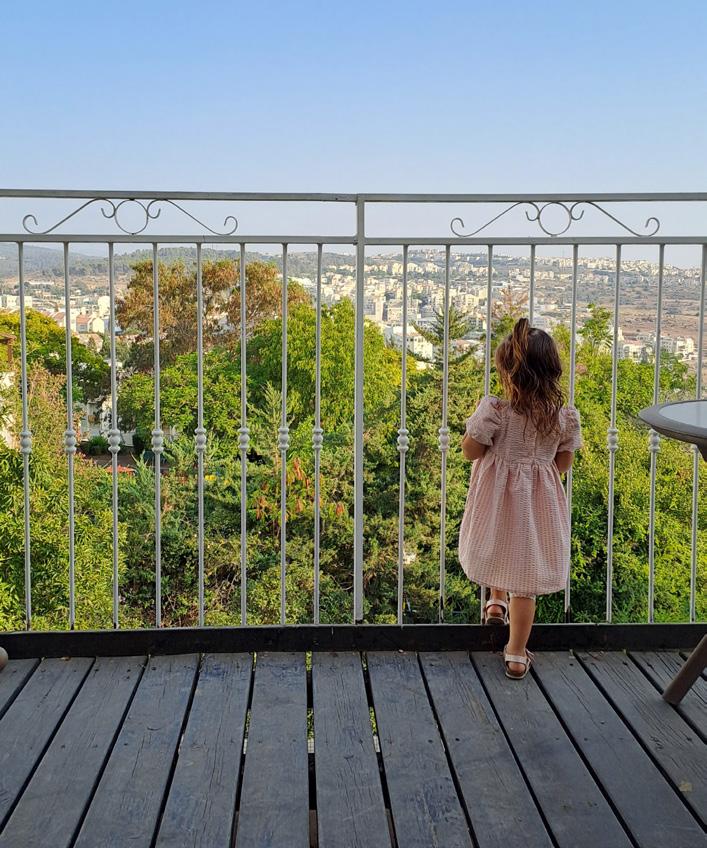
Don’t Be Caught Off Guard
Rebbetzin Dr. Adina Shmidman

Page 62
In memory of my parents Yitzchak & Chana Heller z"l Dedicated by their daughter Dvorah Gorman

YERUSHALAYIM SHABBAT TIMES PARSHAT NITZAVIM-VAYEILECH CANDLES 6:19PM • EARLIEST 5:36PM • HAVDALA 7:30PM • RABBEINU TAM 8:11PM ה"ב ISSUE 1532 ADVERTISING & SPONSORSHIPS 02-560-9125 TorahTidbits.com OU ISRAEL 02-560-9100 AVOT CHAPTER 5-6 9 SEPTEMBER 2023 ▪ ג"פשת לולא ג"כ
ךליו-םיבצנ תשרפ PARSHAT NITZAVIM-VAYEILECH
ץראב ךיקלא 'ה ךכרבו תיברו תייחו ז"ט:ל םירבד
Table of Contents
04 Dear Torah Tidbits Family
Rabbi Avi Berman
08 The Choices We Make The Life We Live
Rabbi Moshe Hauer
12 Aliya By Aliya Sedra Summary
Rabbi Reuven Tradburks
20 This Season’s Leitmotif: Return!
Rabbi Dr. Tzvi Hersh Weinreb
24 To Renew Our Days
Rabbi Lord Jonathan Sacks zt"l
30 Probing the Prophets
Rabbi Nachman Winkler
32 Hidden and Revealed
Rabbi Shalom Rosner
40 OU Israel Schedule
46 The Pomegranate #2 Rabbi Moshe Bloom
48 Special Song Rebbetzin Shira Smiles
THIS WEEK'S COVER IMAGE!
Photographed by Gina Kirsch
50 Selichos: Whistle While You Work
Rabbi Judah Mischel
56 Simchat Shmuel
58
Rabbi Sam Shor
The Historical Voice of Selichot
Rabbi Moshe Taragin
62 Don’t Be Caught Off Guard
64
Rebbetzin Dr. Adina Shmidman
םינב ינבו םינב לדגל יניכזו
Rebbetzin Zemira Ozarowski
66 Building the Land: A Collaborative Effort

Rabbi Aaron Goldscheider
70 The Profile of a Supervisor
Rabbi Gideon Weitzman
72 Shehecheyanu on Winning a Court Case
Rabbi Daniel Mann
74 Dreaming Big with Jews in the Persian Gulf
Sivan Rahav-Meir
76 The Y- Files Weekly Comic Netanel Epstein
78 Torah 4 Teens by Teens
Adele Nemirov // Leora Kashnow
I made Aliyah in 1990 and live in Bet Shemesh. Baruch Hashem we founded Israel's First Safety Center dedicated to reducing the terrible number of preventable accidents in Israel, especially those occuring in and around the home. The photo shows a young girl enjoying a beautiful view of Bet Shemesh from a safe mirpeset. www.kerenyosef.com
HELPFUL REMINDERS
The Ashkenazi community begins to recite Selichot this motzei Shabbat. Many have the custom to recite Selichot at chatzot (12:37am).
The custom is not to recite Mevarchim HaChodesh the Shabbat before Rosh HaShana
2 TORAH TIDBITS 1532 / NITZAVIM-VAYEILECH
CANDLE LIGHTING OTHER
AND HAVDALA TIMES
JERUSALEM
All Times According to MyZmanim (20 mins before Sunset in most Cities; 40 mins in Yerushalyim and Petach Tikva; 30 mins in Tzfat and Haifa)
Daf Yomi this Shabbat: Kidushin 27 * For all Rosh Hashana times see next week's Torah Tidbits

OU Kashrut NCSY Jewish Action JLIC NJCD / Yachad / Our Way OU West Coast OU Press Synagogue/Community Services OU Advocacy OU Israel
MITCHEL R. AEDER, PRESIDENT OF THE ORTHODOX UNION Yehuda Neuberger, Chairman of the Board, Orthodox Union | Dr. Josh Penn, OU Kashrus Commission
RABBI MOSHE HAUER, EXECUTIVE VICE PRESIDENT | RABBI JOSHUA M. JOSEPH, ED.D.
EXECUTIVE VICE PRESIDENT & CHIEF OPERATING OFFICER Rabbi Dr. Tzvi Hersh Weinreb, Exec. V.P. Emeritus
OU KOSHER: Rabbi Menachem Genack, CEO/Rabbinic Administrator OU Kosher | Rabbi Moshe Elefant, COO/Executive Rabbinic Coordinator ISRAEL: Rabbi Yissachar Dov Krakowski, Rabbinic Administrator | Rabbi Ezra Friedman, The Gustave and Carol Jacobs Center for Kashrut Education/ Deputy Rabbinic Administrator
Headquarters: 40 Rector St. 4th floor, New York, NY 10006 212-563-4000 website: www.ou.org
Editor Emeritus: Phil Chernofsky
Editor: Rabbi Aaron Goldscheider | aarong@ouisrael.org
Advertising: Ita Rochel | 02-5609125 or ttads@ouisrael.org
Website: www.torahtidbits.com
Not getting enough TTs? Too many? None at all?
Contact our DISTRIBUTION 050-577-2111 • ttdist@ouisrael.org
Seymour J. Abrams • Orthodox Union Jerusalem World Center • Avrom Silver Jerusalem College for Adults • Wolinetz Family Shul • Makom BaLev • Birthright • Yachad • NCSY in Israel • JLIC in Israel • Camp Dror • Pearl & Harold M. Jacobs ZULA Outreach Center • The Jack Gindi Oraita Program • OU Israel Kashrut
STUART HERSHKOWITZ, PRESIDENT OU ISRAEL Zvi Sand / Yitzchak Fund: Former Presidents, OU Israel | Rabbi Emanuel Quint z”l, Senior Vice President | Prof. Meni Koslowsky, Vice President
VAAD MEMBERS:
Michael Elman | Yonatan Frankel | Yitzchak Fund | Daniella Hellerstein | Stuart Hershkowitz | Jeremy Lustman | Meir Raskas | Atara Reichel | Zvi Sand | Norman Schmutter | Mark Schneider | Esther Williams
RABBI AVI BERMAN, EXECUTIVE DIRECTOR, OU ISRAEL
David Katz, CFO, OU Israel | Chaim Pelzner, Director of Programs, OU Israel | Rabbi Sam Shor, Director of Programs, OU Israel Center | Rabbi Sholom Gold zt"l, Dean, Avrom Silver Jerusalem College for Adults
22 Keren HaYesod <> POB 1441 <> Jerusalem 9101032
phone: (02) 560 9100 | fax: (02) 561-7432
email: office@ouisrael.org
website: www.ouisrael.org
Founders and initial benefactors of the OU Israel Center: George and Ilse Falk a"h
Torah Tidbits and many of the projects of OU Israel are assisted by grants from THE JERUSALEM MUNICIPALITY
OU Israel, Torah Tidbits does not endorse the political or halachic positions of its editor, columnists or advertisers, nor guarantee the quality of advertised services or products. Nor do we endorse the kashrut of hotels, restaurants, caterers or food products that are advertised in TT (except, of course, those under OU-Israel hashgacha). Any "promises" made in ads are the sole responsibility of the advertisers and not that of OU Israel, the OU Israel Center , Torah Tidbits.
OU ISRAEL CENTER 3 ROSH HASHANA NIGHT 1 NITZAVIM-VAYEILECH EARLY CANDLES HAVDALA EARLY CANDLES 5:28 6:10 7:30 5:36 6:19 Yerushalayim / Maale Adumim 5:31 6:27 7:33 5:38 6:37 Aza Area (Netivot, Sderot et al) 5:29 6:28 7:31 5:37 6:37 Beit Shemesh / RBS 5:29 6:25 7:31 5:36 6:35 Alon Shvut 5:30 6:27 7:32 5:38 6:36 Raanana / Tel Mond / Herzliya / K. Saba 5:29 6:26 7:31 5:37 6:35 Modiin / Chashmonaim 5:30 6:27 7:32 5:38 6:36 Netanya 5:30 6:27 7:32 5:37 6:36 Be’er Sheva 5:30 6:27 7:32 5:38 6:36 Rehovot 5:30 6:10 7:32 5:37 6:19 Petach Tikva 5:29 6:26 7:31 5:37 6:35 Ginot Shomron 5:30 6:16 7:32 5:37 6:26 Haifa / Zichron 5:28 6:25 7:30 5:36 6:34 Gush Shiloh 5:30 6:27 7:33 5:38 6:36 Tel Aviv / Givat Shmuel 5:28 6:29 7:31 5:36 6:38 Givat Zeev 5:29 6:25 7:31 5:36 6:35 Chevron / Kiryat Arba 5:31 6:28 7:33 5:39 6:37 Ashkelon 5:30 6:27 7:32 5:38 6:36 Yad Binyamin 5:27 6:19 7:31 5:35 6:29 Tzfat / Bikat HaYarden 5:27 6:24 7:30 5:35 6:33 Golan 5:29 6:25 7:32 5:37 6:35 Nahariya/Maalot 5:28 6:25 7:31 5:36 6:34 Afula Rabbeinu Tam (Jerusalem) - 8:11PM
Z'MANIM
Ranges 11 days Wed - Shabbat Sept 6 - 16 / 20 Elul - 1 Tishrei Earliest Tallit and Tefillin 5:26 - 5:32 Sunrise 6:17 - 6:23 Sof Zman Kriat Shema 9:27 - 9:28 Magen Avraham 8:50 - 8:52 Sof Zman Tefila 10:30 (According to the Gra and Baal HaTanya) Chatzot (Halachic Noon) 12:37 - 12:33 Mincha Gedola (Earliest Mincha) 1:09 - 1:04 Plag Mincha 5:38 - 5:27 Sunset (Including Elevation) 7:01 - 6:48
DEAR TORAH TIDBITS FAMILY
RABBI AVI BERMAN Executive Director, OU Israel
“Rabbi Berman, I don’t know how else to say it. I’m jealous of my kids. They get to learn Torah for hours every day but for me that’s simply not the case. Between minyan, breakfast prep, carpool, work, running home in time for homework, dinner and bedtime with the kids, then finally using the quiet night hours to prepare for the coming day, I simply do not have time to learn. But we’re heading into the Yamim Noraim and I’m feeling anxious. How can I find time to learn?”

Each year I look forward to participating in Avot u’Banim programming with my kids, whether it is organized by our shul or my children’s schools. I find it particularly meaningful when participating in events leading up to Yamim Noraim for two reasons. First, I am delighted by the opportunity to learn with each child individually for a few hours and attend the various shiurim their teachers have prepared. Second, and perhaps more relevant to the majority of Torah Tidbits readers, in the weeks leading up to the Yamim Noraim I feel an added sense of urgency to dedicate more time to learning and connecting with Hashem each day.
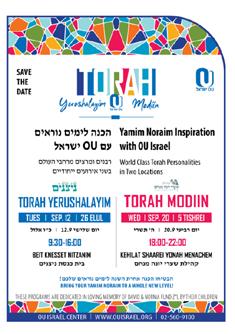
Of course, for those who are fortunate to
learn every day in programs such as Daf Yomi, which just reached 100 years since its founding, there is tremendous merit in learning every day. However, I’ve come to appreciate that the pace of life can interfere with daily learning and have tried to come up with creative ways to bring Torah learning to the masses. Five years ago OU Israel launched Torah Yerushalayim and held the event at the Ramada Jerusalem Hotel in the weeks leading up to the Yamim Noraim.
Past speakers included Rabbanit Shani Taragin, Rabbi Shalom Rosner, Rav Judah Mischel, Mrs. Raphaella Tabak, Charlie Harary, Rabbi Hershel Schachter, Rebbitzein Tziporah Gottlieb (Heller), Sivan Rahav Meir, Rebbitzen Shira Smiles, and countless others who shared their words of Torah with those gathered. From its first year running, Torah Yerushalayim was a success. At last year’s event, following two years of virtual events during Covid, 2,200 participants joined us in person to share in the experience.
With the growing crowds, we recognized the importance of dedicating a set day in which people can come from around the
4 TORAH TIDBITS 1532 / NITZAVIM-VAYEILECH
country to learn Torah together leading up to Rosh HaShana. We also appreciated those who traveled from far to join events in previous years and decided to make the event more accessible to people around the country. I am therefore thrilled to share that this year we are launching a new format and bringing Torah Yerushalayim on the road! This year’s event will include some additional changes which I hope prove meaningful:
TORAH YERUSHALAYIM
Torah Yerushalayim is being moved from the Ramada Jerusalem Hotel to Beit Knesset Nitzanim, led by Rav Shai Finkelstein, in Baka. Partnering with the Nitzanim community has already been a wonderful experience, and I look forward to joining locals and travelers during the event which will take place on Tuesday, September 12 from 9:30 AM - 4:00 PM. Thank you to OU Israel President Stuart Hershkowitz for all of his efforts on this program.
TORAH MODIIN
For participants who prefer an evening event, we worked together with our esteemed OU Israel board members Daniella Hellerstein and Jeremy Lustman to launch Torah Modiin. The event will be held at Kehilat Shaarei Yonah Menachem (KYSM), led by Rav Shlomo Sobol, on Wednesday, September 20 from 6:00 PM – 10:00 PM.
Shiurim in both locations feature a mix of dynamic speakers. I am hopeful that this year’s programming will provide an opportunity for those looking to dedicate a few hours toward Torah learning in the weeks leading up to Rosh HaShana and will find
the experience motivational. I encourage you all to mark off your calendars and enjoy the thoughtful programming that has been created, which will soon be made available.
To recount the efforts that went into creating Torah Yerushalayim and Torah Modiin would be nearly impossible. I am deeply grateful for the dedication of OU Israel staff members, as well as the Nitzanim and KYSM community representatives, who have worked tirelessly to create stimulating programming. Moreover, I am proud to share that the OU Israel team has dedicated itself to adding a new community to partner with every year going forward!
These events would not be possible without the support of the Fund family who dedicate this annual program in loving memory of their beloved parents David & Norma Fund z”l. The Fund families dedicate themselves to building Torah and Jewish life in Israel and around the world. I had the great zechut to have known both David and Norma and remain inspired by their efforts to create kashrut in the United States as well as Torah infrastructures to ensure the continuity of yiddishkeit. Please visit www.ouisrael.org/elultishrei to see the full Torah Yerushalayim and
OU ISRAEL CENTER 5 תמשנ יוליעל In loving memory of ה”ע רתסא לדניישו דוד לארשי תב הדירפ FRIEDA SCHORER a”h on her 6th yahrzeit, לולא ג”כ Schorer, Shames, Apelbaum, Finkelman families
Torah Modiin schedules and to register. I will be at both events and am eager to see you all there. In the meantime, I wish you all a meaningful selichot experience which begins this coming motzei Shabbat. As we focus our efforts in the coming days to refine ourselves and recommit ourselves to Torah and avodat HaShem, I hope the events we have planned will serve as meaningful catalysts as we strive to reach new heights in the coming year together.


Wishing you all an uplifting and inspiring Shabbat,



 Rabbi Avi Berman Executive Director, OU Israel aberman@ouisrael.org
Gilinski Real Estate gilinski.co.il
Arnona Great Apt! 150 SQM, Sukka balcony, elevator & parking. #050-7225694
City Center Penthouse, 340 SQM, 9R, duplex, 2 terraces, parking, renovated. #052-6984466
Rabbi Avi Berman Executive Director, OU Israel aberman@ouisrael.org
Gilinski Real Estate gilinski.co.il
Arnona Great Apt! 150 SQM, Sukka balcony, elevator & parking. #050-7225694
City Center Penthouse, 340 SQM, 9R, duplex, 2 terraces, parking, renovated. #052-6984466













OU ISRAEL CENTER 7 MASSAGE THERAPIST & FITNESS TRAINER 052.673.3704 I www.andyhealth.com | jerusalemmyhome@hotmail.com TUVIA ANDY HAAS BALANCE and FALL-PREVENTION SPECIALIST for OLDER ADULTS Maintain Healthy Bones and Muscles Decrease Stiffness and Joint Pain Increase Strength! Stay Independent! True wholesaler from the diamond boursa with over 25 years experience member diamond dealers club Engagement Rings ∙ Stud Earrings Pendants ∙ Tennis Bracelets 050-573-9061 jeffmor36@gmail.com www.JeffMorDiamondJewelry.com
OU EXECUTIVE VICE PRESIDENT
The Choices We Make, The Life We Live
Bechira, free choice, is a core dimension of our humanity and a foundation of our belief system. As Rambam articulated repeatedly (see Hilchos Teshuva Chapter 5, Shemona Perakim Chapter 8), if we are not free to choose our course of action there is no meaning to and no accountability for Mitzvot. It is because we are free to choose our path in life that we must work to identify and follow the mission and actions that Hashem seeks from us, as we read in our Parsha (30:19), u’vacharta vachaim, “choose life.” Rabbeinu Yonah in his classic Shaarei Teshuva (3:17) understood this verse as dictating a mitzvah to properly exercise our free choice, and notes that the Torah presents its highest values – such as
choosing life, studying Torah, and emulating Hashem in our refinement of character - as positive Mitzvot.

In describing Choice as a mitzvah, there is an implication that we can live life without making choices. This idea was elaborated upon by Rav Eliyahu Dessler in his oft-quoted thesis regarding what he called nekudat habechirah, the Choice Point, where he noted that much of the time we are not making active choices but rather living on established patterns that we, our parents, or our social circle established for us by choices made long before. Each of us has good things that have become built into our routine that we do without even thinking. It is only at the Choice Point that we have the opportunity to move the line of scrimmage, shifting our life’s pattern by making a choice to move things forward, to take our lives and assumed behaviors to the next level.
It is in this dynamic space of Choice that life really happens. It is there where we live today as today, not as a simple replay of yesterday.
Every morning, we make two brachot before we recite the Shema. The first notes Hashem’s creation of the routine of nature as seen in the cycling of day and night, sun and moon. The second bracha recalls when Hashem interrupted that routine by exercising His bechira, His free choice, choosing the Jewish people from all the nations, habocher b’amo Yisrael b’ahava. That choice
8 TORAH TIDBITS 1532 / NITZAVIM-VAYEILECH FROM THE DESK OF
RABBI MOSHE HAUER
May the Torah learned from this issue be תמשנ יוליעל our much missed father, grandfather and great-grandfather BENJAMIN SPIGELMAN z”l ל”ז תידוהיו בוד םוחנ ןב ןויצ-ןב on his 37th yahrzeit - לולא אכ Schorer, Spigelman and Sheinfeld families
was made – as noted in the bracha that follows the Shema – by the disruption of nature and routine through the miracles ofthe Exodus. Indeed, Pesach is the time when Hashem made a choice that completely changed the direction of our lives.

Rosh Hashana, on the other hand, is the anniversary of when Hashem created the routine of nature, and when He looks to us to defy our nature and routine and make change by our own choices. This is the season where we reflect and consider our future direction, shifting that Choice Point in our own lives and in how we will define our field of service and accomplishment.
It is our task during this precious time to make those choices that will ensure that we live today as today, not as a replay of yesterday, even as we envision and build a far better tomorrow, moving things forward for ourselves and for Klal Yisrael.



May the Torah learned from this issue of Torah Tidbits be תמשנ יוליעל and in loving memory of our dear parents


VICTOR COHEN z”l
and
BARBARA COHEN a”h ה”ע יכדרמ םולש תב הכרב
On their first Yahrzeits
24 Elul and 6 Tishrei
Aryeh & Lillian
Shalom & Tova
Michael & Michelle Grandchildren and great-grandchildren
OU ISRAEL CENTER 9
ל”ז ןהכה
ךורב הירא ןב החמש לוולעו
L I V E O P P O S I T E T H E S E A d av id z @ A s h ke lo n P ro p e rt ie s .c o m c a l l D a v i d a t 0 5 4 - 4 3 3 - 2 6 2 1 w w w.a s h ke lo n p ro p e r ti e s .c o m A s h k e l o n Take advantage NOW of the widest selection of new and used homes in Ashkelon. NEWS The Dollar is at a 3 Year High!

FOR SALE IN JERUSALEM:
BAKA (MORDECHAI HAYEHUDI ST.)

Beautiful 5.5-room garden apartment in the heart of Baka, in an Arab-style house, next to Derech Beit Lechem shops & restaurants. Private entrance, 152m, stunning large garden, lots of light. Exclusive! Nava 053664 2512
IN PICTURESQUE YEMIN MOSHE
Unique well-designed house, 290m, nice open patio + balcony to Old City view, near parking, walking distance to the Old City, Mamilla, synagogues, major hotels, the First Station, etc. Exclusive! Galila 053-9345985
TALBIEH (MAPU ST.)
4 rms, first floor, large balcony, private parking, storeroom, private land. Walking distance to King David Hotel, Yemin Moshe, Old City, Mamila. Exclusive! Moshe 053 6305725
3 Moshe Hess St., Jerusalem 0778038511





11 **************** RESTORE YOUR FURNITURE TO HEALTH **************** Website: www.thefurnituredoctor.co.il Email: office@thefurnituredoctor.co.il Phone: 02-999-2418 WhatsApp: 058 787 3755 PERMANENT REGLUING for all your loose & shaky furniture EXPERT SOFA FRAME & RECLINER REPAIR SEAT CORE REPLACEMENT- Brand new seat made to replace broken wooden seat CANE SEAT/BACK REPLACEMENT LEG TIPS - For quieter chairs and helps to prevent water damage to the legs TABLE EXTENSIONS - To accommodate more people at your table Israel's LEADING and MOST TRUSTED Furniture Repair Company LET US FIX YOUR FURNITURE BEFORE THE CHAGIM 125th YEAR ANNIVERSARY for early childhood intervention pidyon pidyon Kaparot Kaparot Happy Rosh Hashanah! Donate Your M a y y o u r g o o d d e e d s s e a l y o u i n t h e B o o k o f L i f e . Give children with disabilities The start in life they deserve! JERUSALEM REAL ESTATE ANGLO- SAXON-JERUSALEM ISRAEL’S LEADING REAL ESTATE NETWORK
ALIYA-BY-ALIYA SEDRA SUMMARY
RABBI REUVEN TRADBURKS RCA ISRAEL REGION

PARSHAT NITZAVIM-VAYEILECH
The Torah ends with 4 very short parshiot. The last parsha of the Torah is read on Simchat Torah. After our double parsha, we have only the short parsha of Ha’azinu. So, we are virtually at the end of the Torah.
Let’s frame our parsha in the context of the book of Devarim. Moshe has taken us from past, to present, to future. Moshe is standing on the banks of the Jordan, knowing he will not be with the people in their entry to the Land. The entire book of Devarim is Moshe’s instructions to the people. He begins with the immediate fears and concerns of the people; how will we be successful in conquering the Land? He reviews the past; lessons to be learned, errors to be avoided, successes to remember. You will be successful. He then paints a picture of the society of ethical monotheism to be created in the Land. And the national institutions of legislature, judiciary and executive. He has gone from the past, to immediate present, to imminent future. Then last week he pivoted to the distant future; the exile that will result inevitably from disloyalty. Though not yet in the Land, Moshe gives a chilling
description of exile from the Land.
And in our parsha, he looks into the even more distant future; the end of the exile and the return to the Land. Hopeful. Optimistic. He has gone from assurance, to dread and back to confidence. And has taken care to articulate to the people, before he takes leave of them, his profound belief in their ultimate ability to return. That in the deepest recesses of their heart is their desire to connect to their G-d. Moshe believes in us.
Although this double parsha has but 70 verses, the emotional impact is hard to match.
1ST ALIYA (DEVARIM 29:9 - 28)
The Brit of Arvot Moav . All the people are gathered, men, women, children, water carriers and woodchoppers to enter the covenant; that G-d will be our G-d and we will be His people. As was said to the Avot. This covenant is with you here today and those not here. Should there be amongst you those chasing idols, rationalizing that they are free to follow their hearts; the consequence of the special bond of this covenant is that your disloyalty, your chasing idol worship will be met with Divine wrath. The destruction of this Land because of your unfaithfulness will be so profound people will look at it and be shocked by its utter desolation. They will recognize that your disloyalty resulted in this desolation and in your
12 TORAH TIDBITS 1532 / NITZAVIM-VAYEILECH
Mazal Tov to Mike Harris and family on the marriage of his daughter Shoshana
more about patient self-control than physical might. It is found in the Talmudic tractate Kiddushin 40a, where the tale is told about a certain Rabbi Zadok, who resists the attempts of a particularly powerful noblewoman to lead him astray. He exerts moral strength, and to him the Talmud applies the following biblical verse: "Bless the Lord, O His angels, mighty creatures who do His bidding, ever obedient to His bidding. Bless the Lord, all His hosts, His servants who do His will." (Psalms 103:20-21)
being tossed out of this Land. The covenant is simple. You. And me. You, G-d will be my G-d. And we will be Your people. It is crucially important to reduce the Torah to this simple, though profound, bond. Sure, there are lots of mitzvot. Some we’ll get right. Some we’ll mess up with. But, after all the detailed mitzvot, it is really You and me. The Jew lives a life walking with the Creator. We are bound together. That bond expresses itself in mitzvot. Certainly. But, Moshe says, it is the walk with the Creator that is our lot in life. A privileged lot indeed.
JERUSALEM SALES
SHAAREI CHESSED / RECHAVIA
*Duplex! 5 bdrms, 25 sqm kitchen, succah, shabbat elevator, 2 parking, storage.
*Renovated 110 sqm 3 bdrms, 1st floor, succah.
*New 228 sqm duplex penthouse, 30 sqm succah, shabbat elevator, parking, view.
TALBIEH-250 sqm+200 sqm garden, priv. land
OLD KATAMON
160 sqm 4 bdrms, garden, storage, parking, Occupancy - 1.5 years.
ARNONA
New renovated 2 bdrms, large balcony, elevator, storage, parking. Can be sold furnished
TALPIOT
4 rms, balcony, elevator, machsan, parking, view.
NACHLAOT
2 rms, priv entr, storage room, NIS 2,210,000
2ND ALIYA (30:1 - 6)
HAR NOF -New listings!
Isaac's way recognizes the necessity for great patience and forbearance. If we adopt Isaac's way, we must be prepared for a lengthy process before our challenges are resolved. In the words of Rabbi Abraham Isaac Kook, words which have been memorialized in a popular song, "An eternal people does not fear the long and arduous path."
*Central! 4 bdrms incl. 2 en suite, entrance level, option for separate unit/office.
*Centrally Located– 10 room duplex with 400 sqm garden (room for a pool), excellent condition
RENTAL - RECHAVIA
May the Torah learned from this issue of TT be in loving memory and נ"על our dear parents whose yahrtzeits are in Kislev
Doris Weinberger a"h
When you are cast out of the Land to the 4 corners of the earth, you will take to heart your fate –and return to G-d. He will return to you, returning to you to gather you from the far-flung places. Even if you are at the ends of the earth, He will gather you and take you from there, to bring you back to this Land.
Spacious 3 bdrms, renovated, succah, priv parking
FOR MANY MORE PROPERTIES: 02-651-4030

Max Weinberger z”l
Greatly missed by their children, grandchildren and great grandchildren
Rav Aryeh and Dvora Weinberger
Bernie and Leah Weinberger
Patience is necessary for those who follow Isaac's way. But a wise woman taught us that patience is but another name for hope. That woman was Jane Austen, who put these words into the mouth of one of the characters in her great novel, Sense and Sensibility: "Know your own happiness. You want nothing but patience—or give it a more fascinating name: call it hope."
Menachem and Hannah Katten
In observance of the Shloshim of our friend
Yehuda Leib Berren z"l
Rav Menachem Weinberg will give a shiur in his memory "Heroic Joy"
Monday evening, 23 November/ 8 Kislev
7:30pm
Zoom Meeting: 853 8980 1519
Password: Yehuda
This is the most beautiful paragraph in the entire Torah. It is so good it is split in the middle, to savor it. It is called Parshat HaTeshuva, the section of Return. The word “return” appears 7 times. We to Him. He to us. We take a step; He steps to us. But our first return is described as “we take it to heart”. Heart murmurings are the beginning of teshuva. And He is our cardiologist, He knows our murmurings, as faint as they may be. Once He senses those murmurings, He empowers us, Gives us the strength, the will to build on our deepest pining. He dances with us, but waits for us to take the first step. Then He gives us more strength and more. Just take that step.
shmuelnathan4@gmail.com
OU ISRAEL CENTER 13
OU ISRAEL CENTER 15
SEALING SERVICES
Exclusive! SHELLY LANDAU PROPERTIES LTD & EVA AVIAD REALTY bayitsheli@gmail.com www.aviadrealty.com 052-385-9944 • 054-499-9043 Rehavia-Talbieh on quiet Radak
Beautiful, spacious 4 room luxury unit, 2.5 baths, 2 oor, Shabbat elevator, large succa terrace, storage + covered parking.
ולסכ 'ד -ה"ע המלש לאקזחי תב האל הרובד
ולסכ ז"כ -ל"ז בד ןב ךלמילא
SERVICES AND ROOFING
SEALING
Eiferman Properties www.eifermanrealty.comLtd.
3RD ALIYA (30:7 - 14)
And He will implant in you love of Him. And you will return to Him. And He will be thrilled with you because your return is with sincerity, a full heart. For this mitzvah is not sublime, as if needing one to ascend the heavens or cross the ocean to retrieve it. Rather it is very close; on your lips and in your heart.
Moshe uses words of affection. Love, love of Hashem. Heart, all your heart. Moshe does not want to be only the teacher of halacha. He wants to be the teacher of our inner life as well. We need tutelage in not only what to do, but also in how to feel. Shake off your inhibitions. Let Him in, with love, with the deepest feelings of your heart, every day. The language is noticeably more emotive than the rest of the Torah. Moshe, as he is departing as leader, and departing from this world desperately wants to convey his deepest feelings and to reach our deepest emotions.
And it is not in heaven. The “it” may be understood to be referring to the entire Torah. As if to say, “I know the Torah looks daunting; but it is not, it is the real you.” Or it could be referring to Teshuva. As if to say, “Change looks daunting; but it is
not, it is the real you.” Moshe is expressing his faith in us. That deep down, everyone has a connection to G-d and to the Jewish people. That is exactly what this verse says; we don’t need to adjust, to adapt to a belief in G-d. We need to be sensitive to, to plumb our real selves, to dig deep and discover ourselves. It is close: on our lips and in our heart.
4TH ALIYA (30:15 - 31:6)
Life and good, death and evil lie before you. Life is a consequence of loyalty to the mitzvot. Destruction awaits lack of loyalty. Heaven and earth stand witness: life and death, blessing and curse lie before you. Choose life. Moshe goes. And speaks to the entire people. I am 120 years old. I will not bring you into the Land; G-d will lead you. And Yehoshua will lead you. G-d will do for you as He did with Sichon and Og. Be strong and firm, do not be afraid or worried; G-d will be with you. He will not let go of you or leave you.
These words are the last of Moshe’s long speech. He will move on to speak of transition of leadership. But these last words are like a tincture, a dilution. After all is said and done, the stakes of this grand venture of mitzvot are nothing short of life and death. And with these words, Moshe prepares to take leave of the people. Nothing more to say. Choose life.
5TH ALIYA (31:7 - 13)
The
Moshe called Yehoshua, and in front of the entire people charged him to be strong and of good courage. For G-d will be with you; He will not abandon you, so be not afraid. And Moshe wrote the Torah and gave it to the bearers
14 TORAH TIDBITS 1532 / NITZAVIM-VAYEILECH
May the Torah learned from this issue of Torah Tidbits be in loving memory of ה”ע ףסוי תב הקבר RIFKA EDELSTEIN A”H
beloved wife, mother, grandmother and great grandmother on her 14th yahrzeit - 25 Elul
Rosner, Edelstein, Sokoloff families
of the Aron. Hakhel: Every 7 years, during Sukkot, when all Israel gathers, read this Torah, so all will learn to have awe and observe the Torah.
Moshe encourages Yehoshua a lot – be chazak, strong, and amatz, mighty. Don’t be afraid. Moshe is addressing Yehoshua’s fears. For although there is a promise to the Jewish people, who knows if I, Yehoshua, am deserving to be their leader. Maybe I am unworthy. That is the healthy humility that every leader should display. Who am I to lead this great nation?
And the mitzvah of Hakhel continues Moshe’s transition of leadership. He is taking leave. Yehoshua is being invested. Why stick in the mitzvah of Hakhel, of reading and teaching the people to fear G-d? Perhaps, and this is conjecture, the mitzvah of Hakhel is not only to teach the people but to teach the King. The King is to read the Torah in front of the people. Perhaps this is the Torah’s version of the 7-year itch. Leaders, businesses, institutions often move in 7-year cycles. After 7 years, take stock. Where are you? Where are you going? Are you on track? Moshe is instructing Yehoshua. You are to lead the people. But as a servant of G-d. Lots will happen as a leader that may make you overly confident, haughty, maybe fearful, pessimistic. Every 7 years, take the Torah and read it;
take stock, publicly. You are the King; but not the King of Kings. You are His servant, serving His people.
6TH ALIYA (31:14 - 19)
G-d calls Moshe and Yehoshua.

A cloud appears. G-d says: this people will seek idols and abandon my covenant. I will leave them. I will hide my Face from them and they will feel I have abandoned them. I will surely Hide Myself from them. Write this song. Teach them this, so it shall be testimony for them.
This aliya turns rough. This is now not Moshe speaking, but G-d speaking to Moshe and Yehoshua. The Jews will rebel. And Hashem will withdraw, will leave the Jews subject to whatever calamities befall them. The greatest theological mystery is contained in this one verse: “I will hide My Face from you.” Chilling. And it is repeated: I will surely hide My Face. The greatest theological challenge, posed in our time by the unfathomable tragedy of the Holocaust, must grapple with this Divine eclipse – Hiding His Face. When and why does He Hide His Face? The Torah states it but does not explain it. And while Jewish history is replete with tragedies, seemingly moments of this Divine eclipse, at least in our time we are warmed by the opposite: we who have returned to His Land are warmed by the Shining of His Face upon us.
7TH ALIYA (31:20 - 30)
I will bring the people to the Land, but they will respond to
OU ISRAEL CENTER 15
Dedicated to the memory of SARAH NANA HIRSCHMAN a”h on her 40th yahrtzeit לולא א”כ ה”ע ליסיירקו השמ בקעי תב הרש Goldsmith, Greenzweig and Englander families
their success with rebellion. Let this song be at the ready for when this occurs. Moshe wrote the song, teaching it to the people. He charged Yehoshua again to be strong.
Moshe commanded the Leviim to place the Torah on the side of the Aron, as a permanent testimony. For, I know this people and they are stubborn and cantankerous. Gather all the leaders so I can charge them, for I am sure that following my death, there will be disloyalty. And Moshe spoke the words of the song to the people.
Moshe is generous to Yehoshua. As if to say, “when things turn ugly, don’t take the blame. All you can do is lead. Whether the people follow or whether they rebel is not of your doing. Be strong.” Generosity to the next leader, doing all to help them succeed is the sign of a leader who leads not for his own ego, fearing the next guy will be better than him, but is the sign of a leader who leads as a servant of the people, only wanting their success.
YESHAYAHU 61:10 - 63:9
This week’s haftorah is the seventh and final installment of a series of seven “Haftarot of Consolation.” The prophet begins on a high note, describing the great joy that we will experience with the Final Redemption, comparing it to the joy of a newly married couple.
Yeshayahu then declares his refusal to passively await the Redemption: “For Zion’s sake I will not remain silent, and for Jerusalem’s sake I will not be still, until her righteousness emerges like shining light...” He implores the stones of Yerushalayim not to be silent, day or night, until G-d restores
Jerusalem and establishes it in glory.
The Haftorah then recounts Hashem’s oath to eventually redeem Zion, when the Jews will praise G-d in Yerushalayim. The haftorah also contains a description of the punishment Hashem will mete out to Edom and the enemies of Israel.
Yeshayahu concludes with the famous statement:
“In all [Israel’s] afflictions, He, too, is afflicted, and the angel of His presence redeemed them...”
Like a loving father who shares the pain of his child, G-d, too, shares the pain of His people, and awaits Redemption along with them.
STATS
Nitzavim
51st of the 54 sedras; 8th of 11 in Devarim. Written on 87 lines in a Torah (rank: 52).
4 Parshiyot; 1 open, 3 closed 40 p’sukimranks 53 (10th in Devarim).
657 words - ranks 51 (8th in Devarim).
2575 letters - ranks 51 (8th in Devarim).
Vayeilech
52nd of the 54 sedras; 9th of 11 Devarim. Written on 72 lines in a Torah (rank: 53).
3 Parshiyot; 2 open, 1 closed.
30 p’sukim - ranks 54th (11th in Devarim).
553 words - ranks 53rd (10th in Devarim).
2123 letters - ranks 53rd (10th in Devarim).
Shortest sedra in number of pesukim; longest pesukim in the whole Torah.
16 TORAH TIDBITS 1532 / NITZAVIM-VAYEILECH
MITZVOT
Nitzavim - No Mitzvot.
Vayeilech - 2 positive mitzvot.
Passing on Our Memories
and our next step will be to plant a fruit tree. I never thought of myself as being the agricultural type, but the feeling of settling and planting a portion of Eretz Yisrael, has been truly euphoric. Iy”H, when we plant our tree, and eat the fruits that will grow one day, I think we will be able to truly appreciate that unique Kedusha found in
Our Sages tell us that we were redeemed from Egypt on the merit of the righteous women. The men in Egypt were enslaved, both physically and mentally; their morale was extremely low, as it seemed that thereing Egypt. In addition, Paro had given the midwife's explicit instructions to kill all the male children, and, when they disobeyed -
would be the end of the children of Israel, who would have perished before we could become an independent nation.
they were not willing to surrender to the evil decree, they refused to succumb to the sadistic ruler of Egypt. They enticed their husbands and continued to give birth to boys and girls. Many were killed and some were able to get away, but the Jewish peo ple as a whole survived, due to the tenacity and determination of Jewish women.
To conclude, when you buy your Tu B'shvat fruit this year, don’t search for those dried apricots and banana chips imported from Turkey. Rather, head over to the fresh produce and buy yourself some nice juicy Kedusha-filled Jaffa oranges and thank in ,

vants and soldiers to go and find Jewish
Jewish men were distraught, asking themselves whether it was even worth it to continue having children, who would inevitably die at the hands of their cruel Egyptian masters. They separated from their wives, stopped having children, and waited for the fateful demise of the Jewish
achievements and unswerving faith of our incredible Jewish women, it also empha sizes that the future of the Jewish people is dependent on the birth of Jewish children. Without babies being born the Jewish peo ple cannot survive.
imbibing that Kedusha in every bite that
centered on children, and on passing the tradition from one generation to the next. The Torah instructs us "and you shall tell
A SHORT VORT
BY RABBI CHANOCH YERES
 R av, Beit Knesset Beit Yisrael, Yemin Moshe
R av, Beit Knesset Beit Yisrael, Yemin Moshe
)ב-א:אל( אובלו תאצל דוע לכוא אל....רבדיו השמ ךליו "And Moshe went and spoke…I can no longer go out and come in." (31:1-2)

The pasuk refrains from telling us where Moshe went. The verse says "he went" but where to?
The Ibn Ezra (1089-1167) explains logically that Moshe went to each tribe telling personally that he would be passing away soon and to help give support to Yehoshua as the new leader.
The Kli Yakar (1550-1619 Prague) adds depth to this idea. Moshe was concerned that people would think he had been "retired" by others due to his old age and losing mental balance. He therefore marched personally throughout the camp to demonstrate that he still remains with his physical and mental capabilities. The only reason for his departure was the Divine decree by G-d.
Shabbat Shalom
OU ISRAEL CENTER 17
16 TORAH TIDBITS 1511 / TZAV / SHABBAT HAGADOL - PESACH - SHEMINI
OU ISRAEL CENTER 75
Hachnassat Kalla - YAD GITTEL Get your trousseau (nedunya) at COST PRICE
For more details call 0523882751 or Sonia 0528066664 yadgitteltrudy@gmail.com

As Elul is here, and Rosh Hashanah The Day of Remembrance draws near, We remember our over 200 poor and needy families. Send your contributions to: Clara Hammer Chicken Fund P.O.B.18602 Jerusalem 91185 | Tel.02-5823477

Donate via PayPal at Chickenladyofjerusalem.com
Or pay Hacker's Butcher Shop Directly via credit card Tel. 02-5819378


The daughter and granddaughters of Mrs. Chana (Hammer) Homnick a"h are continuing to run The Chicken Fund in their grandmothers' memory.


18 TORAH TIDBITS 1532 / NITZAVIM-VAYEILECH
enumerated. Yishmael dies. His descendants dwell from Egypt to Assyria. Yishmael’s story is brief. He has numerous and powerful offspring. The brevity
Flying Soon? Travel with Confidence
1UniTravel - Medical Insurance at great prices Choose from multiple options
A SHORT VORT
1unitravel.brokersnexus.com
his son Shlomo succeed him. Adoniyahu convinces two very significant personalities - the High Priest and the commander of King David’s armies - to
www.angelrealty.co.il
BY RABBI CHANOCH YERES R av, Beit Knesset Beit Yisrael, Yemin Moshe

1UniSim - Sims for USA and Worldwide
For Sale in Efrat
Zayit: * 300 meter cott age, Pitum
Haketoret St. 4,990,000 NIS
Starting at $40 sales@1unisim.com
Call 077-400-3199 or USA 718-715-0001


*The Village – 8 room cottage, 4,700,000 NIS
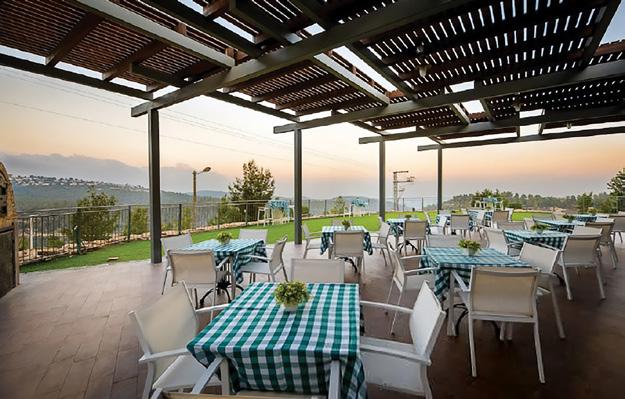
When Avraham addresses the people of Cheit, trying to acquire a burial spot for his wife, he says “Ger V’Toshav Anochi Eimachem” (23:4) “A Stranger and a Resident am I with you” This seems to be a contradiction. If one is a stranger than he is not a resident, if he is a resident than he is no longer a stranger. What did Avraham mean?
Dagan: * 4 room garden apt.
100m, 2,590,000 NIS
* Duplex with amazing garden – 6 rooms. 3.65 million
The Magid of Dubno (Jacob ben Wolf Kranz 1741-1804) explains that Avraham watched how he spoke in this tense situation in order to, both, state his truth and be able to keep the peace -Shalom Bayit. Avraham said, on the one hand, “I am a Resident’ due to G-d’s promise to receive this Land and on the other hand, I still need your agreement to purchase a plot. In other words, Avraham implied “I am the resident” and you are the “strangers”, while they understood him as saying that “they” are the residents and Avraham is the stranger. The peace was kept, and Avraham remained true to his ideals.
Tamar: * Semi attached home - 8 rooms. 4.5 million
Gefen: * 3 room apt. Option to add on a full floor. 1,690,000 NIS
For Sale in Ramot B
7 room, stunning semi attached home. Great gard en. 6.5 million
We are a young senior couple looking for a 1 bedroom furnished apartment in Jerusalem from December 2021-June 2022
Gabi- 0524588716
0524419731
OU ISRAEL CENTER 19
zvilapian@gmail.com Tel. 054-447-3851 Toll free UK: 0800-098-8428 US: 1-800-376-1803 Join Zvi Lapian for an exceptional and relaxing SUKKOT at the NEVE ILAN Hotel in the Judean Hills Sep 29 - Oct 7 2023 Scholar in Residence Rabbi Professor Daniel Sinclair Mehadrin Rabbanut zvilapian@gmail.com Tel. 054-447-3851 Toll free UK: 0800-098-8428 US: 1-800-376-1803
Hosted by Zvi Lapian & Michael Smigel
THE PERSON IN THE PARSHA
BY RABBI DR. TZVI HERSH WEINREB OU Executive Vice President, Emeritus

“This Season’s Leitmotif: Return!”
We have all been brought up to believe in the importance of progress. For the past several centuries, the goal of philosophy, religion, culture, and certainly science has been to develop ideas and practices which advance humankind beyond its present state.
Poets have acclaimed the superiority of progress; one of them, Robert Browning, put it this way:
“Progress, man’s distinctive mark alone, Not God’s, and not the beasts’: God is, they are;
Man partly is, and wholly hopes to be.”
Browning is certainly not the only person who enthusiastically endorsed progress to the point of seeing it as the hallmark of humanity, and as that which sets him apart from and above the animal world, and even distinguishes him from the Almighty Himself.
So forceful has been the emphasis upon progress that any attempt to return to past ideas and methods is almost universally criticized as backward and primitive, and, at the very least, old-fashioned. The antonym for progress, regress, is a word with strong negative connotations. No one wants to be seen as a regressive.
At this time of the year, just before Rosh
Hashanah, the Jewish New Year, the theme of progress is definitely in the air. We all hope to progress to a better year, to a year of growth and development. Indeed, many synagogues conclude the old year and begin a new one with the refrain, “May this year and its curses be gone, and may a new year with its blessings begin!”
No one seems to wish that the coming year be one of status quo. Certainly, very few hope for a return to the past.
And yet, it is precisely “return” that our Torah promulgates, especially at this time of year.
This week’s Torah portion, Parshat Nitzavim, contains the following passage (Deuteronomy 30:1-10). I provide a literal translation of some of the verbs, in accordance with their Hebrew root:
“When all these things befall you—the blessing and the curse…And you take them to heart [literally, and you return them to your heart]...And you will return to the Lord your God, and you and your children will heed His command...Then the Lord your God will return your captivity...He will return you from all the nations...You will return and again heed the voice of Lord...For the Lord will return to delight in your well-being...Once you
20 TORAH TIDBITS 1532 / NITZAVIM-VAYEILECH
return to the Lord your God with all your heart and soul.”
In the space of just several verses, the word “return” appears, in one form or another, at least seven times! It was in the writings of the great Nechama Leibowitz that I first learned the importance of a word that appears repetitiously in the course of a single text. We are to think, she wrote, of such a term as a leitvort, a leading word, a word which gives us a clue and leads us to the deeper meaning of the text at hand.
Even my limited familiarity with the German language was sufficient for me to draw the comparison between leitvort, a word that identifies the theme of an entire passage, and the word leitmotif, which is a thought or melody that pervades a literary work or a musical composition.
The ten days that begin on Rosh Hashanah and conclude on Yom Kippur are known as the Aseret Yemei Teshuvah , which is usually translated as The Ten Days of Repentance. But teshuvah does not really mean repentance, and it certainly does not mean penitence, as it is frequently rendered. Rather, it means return.
The leitmotif of this entire season is the Torah’s call for us to engage in profound introspection and to return to a place which we have lost, forgotten, or abandoned. It is not progress that is demanded of us during the next several weeks; it is, oddly enough, regress.
It can legitimately be asked, return to what? I would like to provide an answer or two to that question, inspired by the book that I find so personally meaningful at this time of year. It is The Lights of Teshuvah, by
Rabbi Abraham Isaac Kook.
Rav Kook emphasizes that over the course of time, we each develop as individuals, and in that process isolate and alienate ourselves from others, from our families, from the people of Israel. To return means to return from our self-centeredness to the collective, from the prat, or single unit, to the klal, or all-encompassing group. There can be no teshuvah unless the person reconnects with larger components of society. We all, in our heart of hearts, know the ways in which he has cut himself off from significant people in his life, and each of us knows how to reconnect to those individuals.
My experience as a psychotherapist has taught me that there is another destination to which it would pay for us to return. I speak of our childhood. As we mature and develop in life, we grow in many positive directions. But we also move away from our innocence, from our childish enthusiasm, from the hope and sense of potential that characterizes the young, but which older individuals eschew cynically.
People find it very rewarding to, if only in their imaginations, return to their youth and recapture some of the positive qualities that they left behind as they made their adult choices.
May the Torah learned from this issue of Torah Tidbits be תמשנ יוליעל ל”ז
on her 9th Yahrzeit - 28 Elul
Lovingly missed by Ehrlich and Stodel Families
OU ISRAEL CENTER 21
ךילרא השמ תב הנח
Finally, we all need to return the Almighty, to His Torah, and to His Land.
No matter how intense our worship of Him during the past year was, we can return to Him for an even stronger connection.
No matter how studiously we explored His Torah, we can return to even deeper levels of its impenetrable depth.
No matter how loyal our faithfulness to the land of Israel was, we can return to even greater loyalty and more courageous faith.
And no matter what our relationship was with others in our lives, we can draw upon our own inner sources of generosity and compassion and enhance those relationships in a spirit of genuine teshuvah, of returning to those others, and, in the process, to our truer selves.
find your style: www.etz-ron.com
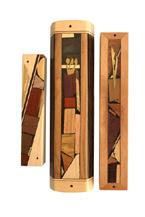

LIFE SETTLEMENTS
Do you have a life insurance policy you:
• No longer want?
• No longer need?
• Can no longer afford the premium?
• Could you use extra money instead of keeping your policy?

I can guarantee that if you qualify with the underwriting process I can get you more money than if you cash it in with the company.
Please contact Moshe Russell at: Buymypolicy32@gmail.com

22 TORAH TIDBITS 1532 / NITZAVIM-VAYEILECH
Discover Beautiful Wooden Judaica





OU ISRAEL CENTER 23 The only mobility scooter without Gramma! Ready to go in 10 seconds. Folds and splits into 2 lightweight parts For more information, visit our website at: movinglife.co.il/torah For a FREE DEMO Call 077-2305650 SHABBATTO scooter offers a "Mehudar" Zomet-approved Shabbat mechanism that operates according to the "Existing Current Modulation" principle. The Shabbat mechanism is pre-installed and does not require expensive fitting. Immediate delivery before the Chag Your Jewelry is Worth Gold! @Fancycolors vmkdiamonds.com vmk_diamonds Jewelry Manufacturer Upgrade your old Jewelry piece to a new modern design Best rate for broken and old gold pieces, inheritances Service in Hebrew | English | French | Italian Safe & Convenient Member of the Israel Diamond Exchange & the World Federation since 1997 Pay Cash 054-397-7707 Mishael Vardi
COVENANT & CONVERSATION
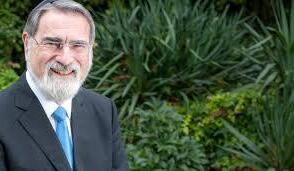
To Renew Our Days
The moment had come. Moses was about to die. He had seen his sister Miriam and brother Aaron predeceased him. He had prayed to God – not to live forever, not even to live longer, but simply, “Let me go over and see the good land beyond the Jordan” (Deut. 3:25). Let me complete the journey. Let me reach the destination. But God said no:
“That is enough,” the Lord said. “Do not speak to me anymore about this matter.” (Deut. 3:26)
God, who had acceded to almost every other prayer Moses prayed, refused him this.1
1. There is an important lesson here: It is the prayers we pray for others, and others pray for us, that are answered; not always those we pray for ourselves That is why when we pray for the healing of the sick or the comfort of the mourners we do so specifically “in the midst of others” who are ill or bereaved. As Judah Halevi pointed out in The Kuzari, the interests of individuals may conflict with one another, which is why we pray communally, seeking the collective good.
What then did Moses do on these last days of his life? He issued two instructions, the last of the 613 commands, that were to have significant consequences for the future of Judaism and the Jewish people. The first is known as Hakhel, the command that the king should summon the people to gather during Succot following the seventh, Shemittah year:
“At the end of every seven years, in the year for cancelling debts, during the Festival of Tabernacles, when all Israel comes to appear before the Lord your God at the place He will choose, you shall read this law before them in their hearing. Assemble the people - men, women and children, and the foreigners residing in your towns - so they can listen and learn to fear the Lord your God and follow carefully all the words of this law. Their children, who do not know this law, must hear it and learn to fear the Lord your God as long as you live in the land you are crossing the Jordan to possess.” (Deut. 31:10-13)
There is no specific reference to this command in the later books of Tanach, but there are accounts of very similar gatherings: covenant renewal ceremonies, in which the king or his equivalent
24 TORAH TIDBITS 1532 / NITZAVIM-VAYEILECH
May the learning of these Divrei Torah be תמשנ יוליעל HaRav Ya'akov Zvi ben David Arieh zt"l
RABBI LORD JONATHAN SACKS ZT"L Former Chief Rabbi of the United Hebrew Congregations of the Commonwealth
תומשנ יוליעל ה״ע רטרש קחצי תב הינעמו בייל הירא ןב לאירזעו ה״ע זייא דוד לארשי תב הדלוגו רשא בקעי ןב סחנפ
THOUGHTS ON THE WEEKLY PARSHA
assembled the nation, reading from the Torah or reminding the people of their history, and calling on them to reaffirm the terms of their destiny as a people in covenant with God.
That, in fact, is what Moses had been doing for the last month of his life. The book of Deuteronomy as a whole is a restatement of the covenant, almost forty years and one generation after the original covenant at Mount Sinai. There is another example in the last chapter of the book of Joshua (see chapter 24 of the book of Joshua), once Joshua had fulfilled his mandate as Moses’ successor, bringing the people across the Jordan, leading them in their battles, and settling the land.
Another occurred many centuries later in the reign of King Josiah. His grandfather, Menasseh, who reigned for fifty-five years, was one of the worst of Judah’s kings, introducing various forms of idolatry, including child sacrifice. Josiah sought to return the nation to its faith, ordering among other things the cleansing and repair of the Temple. It was in the course of this restoration that a copy of the Torah was discovered,2 sealed in a hiding place, to prevent it being destroyed during the many decades in which idolatry flourished and the Torah was almost forgotten. The king, deeply affected by this discovery, convened a Hakhel-type national assembly:
“Then the king called together all the
2. This is Radak and Ralbag’s understanding of the event. Abarbanel finds it difficult to believe that there were no other copies of the Torah preserved even during the idolatrous periods of the nation’s history, and suggests that what was discovered sealed in the Temple was Moses’ own Torah, written by his hand.
Jerusalem Real Estate is My Business
Eta: 054-723-3863
Amazing stand alone homes in OLD KATAMON, TALBIYA, BAKA, GERMAN COLONY


OLD KATAMON 80 sqm with 2 bedrooms and 2 baths, one flight up with elevator. Completely renovated with terrace that opens into a sukka. Full of light & surrounded by greenery. Very quiet. 4,200,000 NIS

Fantastic opportunity to buy 170 sqm on one floor, with sukka terrace, Shabbat elevator, brand new apartment ready in 1.5 years. Only 6,500,000 NIS.
OLD KATAMON, Moshava
Bldg. 74 sqm, two beds, 2 baths & 2 terraces. 3rd floor great views. Available immediately. 2 elevators, underground parking. 24/7 doorman. 3,650,000 NIS


3,850,000 NIS
In GERMAN COLONY, 140 sqm on one floor, 2nd floor walk up, completely renovated. 4 bedrooms and 2 full baths. Large sukka terrace. 7,100,000 NIS

Eta Morris Realty, Ltd.

etamorrisrealestate@gmail.com

Eta: 054-723-3863
etamorrisrealty.co.il

OU ISRAEL CENTER 25
MEKOR HAIM 100 sqm with 3 bedrooms and 2 full bathrooms, registered parking and sukka terrace. Shabbat elevator. Price
elders of Judah and Jerusalem. He went up to the Temple of the Lord with the people of Judah, the inhabitants of Jerusalem, the priests and the prophets - all the people from the least to the greatest. He read in their hearing all the words of the Book of the Covenant, which had been found in the temple of the Lord. The king stood by the pillar and renewed the covenant in the presence of the Lord - to follow the Lord and keep his commands, statutes, and decrees with all his heart and all his soul, thus confirming the words of the Covenant written in this book. Then all the people pledged themselves to the Covenant.” (2 Kings 23:1-3)
The most famous Hakhel-type ceremony was the national gathering convened by Ezra and Nehemiah after the second wave of returnees from Babylon (Neh. 8-10). Standing on a platform by one of the gates to the Temple, Ezra read the Torah to the assembly, having positioned Levites throughout the crowd so that they could explain to the people what was being said. The ceremony that began on Rosh Hashanah, culminated after Succot when the people collectively “bound themselves with a curse and an oath to follow the Law of God given through Moses the servant of God and to obey carefully all the commands, regulations and decrees of the Lord our Lord” (Neh. 10:29).
The other command – the last Moses gave the people – was contained in the words: “Now write down this song and teach it to the Israelites,” understood by rabbinic tradition to be the command to write, or at least take part in writing, a
Sefer Torah. Why specifically these two commands, at this time?
Something profound was being transacted here. Recall that God had seemed brusque in His dismissal of Moses’ request to be allowed to cross the Jordan. “That is enough … Do not speak to me anymore about this matter.” Is this the Torah and this its reward? Is this how God repaid the greatest of the prophets? Surely not.
In these last two commands God was teaching Moses, and through him Jews throughout the ages, what immortality is – on earth, not just in heaven. We are mortal because we are physical, and no physical organism lives forever. We grow up, we grow old, we grow frail, we die. But we are not only physical. We are also spiritual. In these last two commands, we are taught what it is to be part of a spirit that has not died in four thousand years and will not die so long as there is a sun, moon, and stars.3
God showed Moses, and through him us, how to become part of a civilisation that never grows old. It stays young because it repeatedly renews itself. The last two commands of the Torah are about renewal: first collective, then individual.
Hakhel, the covenant renewal ceremony every seven years, ensured that the nation would regularly rededicate itself to its mission. I have often argued that there is one place in the world where this covenant renewal ceremony still takes place: the United States of America.
The concept of covenant played a decisive role in European politics in the 3. See Jeremiah 31.
26 TORAH TIDBITS 1532 / NITZAVIM-VAYEILECH
sixteenth and seventeenth century, especially in Calvin’s Geneva and in Scotland, Holland, and England. Its longest-lasting impact, though, was on America, where it was taken by the early Puritan settlers and remains part of its political culture even today. Almost every Presidential Inaugural Address – every four years since 1789 – has been, explicitly or implicitly, a covenant renewal ceremony, a contemporary form of Hakhel. In 1987, speaking at the bicentennial celebration of the American Constitution, President Ronald Reagan described the constitution as a kind of “covenant we’ve made not only with ourselves but with all of mankind… It’s a human covenant; yes, and beyond that, a covenant with the Supreme Being to whom our founding fathers did constantly appeal for assistance.” America’s duty, he said, is “to constantly renew their covenant with humanity… to complete the work begun 200 years ago, that grand noble work that is America’s particular calling – the triumph of human freedom, the triumph of human freedom under God.”

If Hakhel is national renewal, the command that we should each take part in the writing of a new Sefer Torah is personal renewal. It was Moses’ way of saying to all future generations: It is not enough for you to say, I received the Torah from my parents (or grandparents or great-grandparents). You have to take it and make it new in every generation.
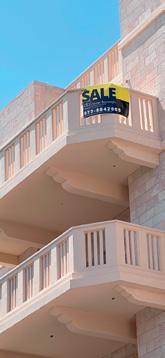
One of the most striking features of Jewish life is that from Israel to Palo Alto, Jews are among the world’s most enthusiastic users of information technology and have contributed disproportionately to its


OU ISRAEL CENTER 27 German Colony-New Project 87sqm 2br, 2bath, succa, parking - 3 8M nis Talbieh,for people that can afford over 400 sqm , view, one level +++ Whatsapp : 052-2636656 usa# 5164675892 , uk# 2037697899 www.daniels-assets.com For a large selection of properties, go to: Old Katamon-Amazing villa Over 1000 sqm plot ,650 sqm house Exclusive offers to our clients Gershon Agron 24, Mamilla - Jerusalem Old Katamon-New and ready 3br apartment,2bath, parking-4 6M nis David Crown complex 136sqm ,15sqm terrace, concierge ... BAKA-NEW PROJECT 2-4br contact us for pre-sale offers Rechavia - Ben Maimon blvd. 170 sqm whole floor, 2 apartments for sale Musrara near the old ci
s
m pat
6.1M
C a l l n o w : 0 7 7 - 9 9 7 3 1 8 5
ty 160 sqm high ceiling
, 35 sq
io-
nis
development (Google, Facebook, Waze). But we still write the Torah exactly as it was done thousands of years ago – by hand, with a quill, on a parchment scroll. This is not a paradox; it is a profound truth. People who carry their past with them, can build the future without fear.
Renewal is one of the hardest of human undertakings. Some years ago, I sat with the man who was about to become Prime Minister of Britain. In the course of our conversation he said, “What I most pray for is that when we get there (he meant, 10 Downing Street), I never forget why I wanted to get there.” I suspect he had in mind the famous words of Harold Macmillan, British Prime Minister between 1957 and 1963, who, when asked what he most feared in politics, replied, “Events, dear boy, events.”
Things happen. We are blown by passing winds, caught up in problems not of our making, and we drift. When that happens, whether to individuals, institutions, or nations, we grow old. We forget who we are and why. Eventually we are overtaken by people (or organisations or cultures) that are younger, hungrier, or more driven than us.
The only way to stay young, hungry, and driven is through periodic renewal, reminding ourselves of where we came from, where we are going, and why. To what ideals are we committed? What journey are we called on to continue? Of what story are we a part?

How precisely timed, therefore, and how beautiful, that at the very moment when the greatest of prophets faced his own mortality, that God should give him, and
us, the secret of immortality – not just in heaven but down here on earth. For when we keep to the terms of the covenant, and making it new again in our lives, we live on in those who come after us, whether through our children or our disciples or those we have helped or influenced. We “renew our days as of old” (Lamentations 5:21). Moses died, but what he taught and what he sought lives on.
28 TORAH TIDBITS 1532 / NITZAVIM-VAYEILECH
These weekly teachings from Rabbi Sacks zt”l are part of his ‘Covenant & Conversation’ series on the weekly Torah teaching. With thanks to the Schimmel Family for their generous sponsorship, dedicated in loving memory of Harry (Chaim) Schimmel. Visit www.RabbiSacks.org for more.









OU ISRAEL CENTER 29 CamScanner 12 months occupancy Oln y a fewapartmentslef t f o r .elas 2 rooms from ₪2,672,000 3 rooms from ₪3,720,000 Penthouses from ₪5,480,000 Garden apt from ₪5,540,000 sales@platinumr.co.il 072-397-0227 Contact us now: Where the aristocratic Baka neighborhood meets the picturesque Abu Tor, on Amindav Street, 2 delux residential buildings will be built. There will be a limited number of exclusively designed apartments. Magnificent views / Luxury Specs / Central location
BY RABBI NACHMAN (NEIL) WINKLER Faculty, OU Israel Center

PROBING THE PROPHETS
“Sos Asis BaShem”!! The glorious cry of Knesset Yisrael (the body politic) to the nation (or, the nation to Jerusalem) urging them to rejoice over Hashem’s soon-to-be redemption, is understood both as “I shall rejoice intensely with Hashem” as well as “in Hashem” – and both are correct! Israel will rejoice IN Hashem, that is, THROUGH His redemption and deliverance of His people and WITH Hashem, who will join His children in their joy and their celebration. This joyful exclamation is a most fitting opening to the last of seven haftarot of consolation, expressing Israel’s full acceptance of – and faith in -G-d’s comforting promises.
Yet, as powerful and as emotional as our haftarah’s initial words are, it is important to realize that they are not found in the beginning of the 61st chapter of Sefer Yishayahu but in the final verses. Given the passionate expression of joy spoken by the long-suffering nation, we might expect the collective cry to precede the chapter describing the glorious future that awaits Israel. The fact that it does not, begs us to study the earlier p’sukim in that perek – those not included in the haftarah – in order to learn what it was that had the nation respond with such overwhelming joy expressed in these rapturous words. Upon doing so, we find these earlier p’sukim replete with Divine promises regarding the years to come – as earlier chapters are as well. But unique to these
promises is that they stand in clear contrast to the prophecies of doom and disaster. Yishayahu opens his address by clarifying the purpose of his latest message:
He begins his prophetic message by telling the people: “G-d has anointed me…to bind the brokenhearted”, and then starts to enumerate missions upon which Hashem had sent him, including:
• “proclaiming freedom for the captives…
• “releasing the imprisoned from bondage…
• “comforting all who grieve….
• “and bringing “splendor in place of ashes to all mourners of Zion.”
As in the many earlier prophecies of comfort, the navi continues describing the future glory, success and fame that awaits the nation – but now he also gives assurances to the nation that G-d would “remove the shame” that years of suffering and exile had caused them. Additionally, Yishayahu assures them: “brit olam echrot lahem”, that Hashem would seal a “new”, eternal covenant with Israel, creating a new relationship to repair the one that Israel had abused and ignored. I would propose that it was these promises that struck the hearts of the humbled nation, and bring Knesset Yisrael to burst forth in their cry of “Sos Asis BaShem!”, to rejoice intensely in/with G-d.
Given this “prequel” to this haftarah,
30 TORAH TIDBITS 1532 / NITZAVIM-VAYEILECH
Rabbi Winkler's popular Jewish History lectures can be viewed by visiting the OU Israel Video archive: https://www.ouisrael.org/video-library
we can better appreciate the message that follows in the haftarah itself. After sharing Hashem’s promises with the people, the navi makes his own promise as well: “L’ma’an Tziyon lo echesheh…!” “I (too) will not remain silent for the sake of Tziyon!” Yishayahu promises the nation that he would pray to G-d for the welfare of Yerushalayim and continues by presenting a most remarkable challenge to the people. Just take a look at the 6th and 7th verses of the 62nd perek – read those words that, I’m sure, are well-known to many: “Al chomotayich, Yerushalayim, hifkadti shomrim..” – the navi tells us that guards have been appointed over the walls of Yerushalayim all day and night. But who appointed these guards? And who are the “guards”? And what was their job?
How beautifully does Rav Yigal Ariel explain that it was Yishayahu himself, he
who pledged that he would not remain silent for Tziyon, it is HE who appointed the guards; the “guards” included all of those who mourned for Jerusalem (Ibn Ezra, Radak); their mission was “al domi lachem” – not to remain silent –as the prophet promised HE wouldn’t-“Ad shey’chonen v’ad sheyasim et Yerushalayim tehilla ba’aretz” – until G-d establishes and makes Yerushalayim a source of praise in the world!
REMARKABLE!! Yishayahu charges us all to continue praying to G-d for Yerushalayim.
• Don’t be silent!!!
• Don’t be passive!!
• Don’t leave G-d alone;
• Keep “bothering” Him!!!
This is precisely what the navi promised to do himself.

That is precisely what the psalmist meant when he penned “Im eshkachech Yerushalayim….”
And this is precisely what we should keep in mind each time we ask Hashem “Uv’nai Yerushalayim, or “HaMachazir shecinato l’Tziyon”.
We are fulfilling the charge that Yishayahu set before us ….and we are doing G-d’s will.




OU ISRAEL CENTER 31
WRITING A BOOK or READY TO PUBLISH ONE? KOCHAV PRESS produces quality books at affordable prices. 0 5 0 - 6 9 9 - 3 2 2 6 200 square meter, 5 bedroom cottage Beautiful, well maintained property on a large lot Expansive kitchen Spacious living room with separate dining area Lisa: 054-311-6270 FOR SALE BEIT SHEMESH Sheinfeld neighborhood
Hidden and Revealed
only God is aware, (תורתסנה), will not be attributed to others, and in connection with those “hidden” actions, others will not be accountable.
RAMBAN - INADVERTANT VS DELIBERATE TRANSGRESSIONS
The hidden things belong to Hashem, Elokeinu, but the revealed things apply to us and to our children forever: that we must fulfill all the words of this Torah . (Devarim 29:28).
In the pasuk alluded to above, it is not readily apparent as to what items are hidden and belonging to God as juxtaposed with revealed items applicable to mankind. Rabbeinu Behaye cites five explanations from Rishonim, including his own suggestion.

RASHI - ARVUT- JOINT RESPONSIBILITY
Rashi understands the pasuk as referring to the responsibility of each individual towards others. This is better known as the principle of תוברע (arvut). This explanation is consistent with the end of the pasuk that relates to fulfilling the precepts of the Torah הרֹותה ירבד־לכ־תא תֹוׂשעל. Similar to a guarantor (literal translation), each individual is responsible for the actions of a fellow Jew. Rashi distinguishes that we are only responsible for actions of others performed in public. Transgressions that another commits in private, of which
The Ramban interprets the term “hidden” as referring to transgressions that one commits but is unaware that such actions are prohibited. With respect to those inadvertent transgressions of which God alone is aware, the transgressor will not be held fully responsible. However, with respect to the transgressions that one commits, being fully aware of his or her actions )ןודזב(, one will indeed be held accountable.
IBN EZRA - PRIVATE VS PUBLIC IDOLATRY
The Ibn Ezra suggests that the term “hidden” refers to one who engages in idolatry in private, and will be punished by God. However, if one worships idolatry in public, then וננבלו ונל – it is the nation’s duty to deal with that individual as prescribed in the Torah. This is consistent with the previous verses that provide the fact that worshiping idolatry will lead to the destruction of the people and the land of Israel.
םהל ווחתׁש יו םירחא םיהֹלא ודבעיו וכליו
For they went and served other deities, prostrating themselves to them deities which they had not known, and which He
32 TORAH TIDBITS 1532 / NITZAVIM-VAYEILECH
RABBI SHALOM
Rav Kehilla, Nofei HaShemesh Maggid Shiur, Daf Yomi, OU.org Senior Ra"M, Kerem B'Yavneh
ROSNER
וֹנינבלזו ונל תֹלגנהו וניקֹלא ’הל תֹרתסנה תאֹזה הרֹותה ירבד־לכ־תא תֹוׂשעל םלֹוע־דע )חכ:טכ םירבד(
’ה ףא־רחיו :םהל קלח אֹלו םועדי־אֹל רׁש א םיהֹלא ה ָ֖ בותכה הללקה־לכ־תא הילע איבהל אוהה ץראב )וכ-הכ :טכ םירבד( הזה רפסב
had not apportioned to them. And Hashem’s fury raged against that land, bringing upon it the entire curse written in this book.
(Devarim 29: 25-26).
RAMBAM – DUTY TO FULFILL MITZVOT EVEN IF REASON IS HIDDEN
The Rambam identifies the term “hidden” as referring to the reasons for the mitzvot. We may not comprehend the reasons behind each command ימעט( )תווצמה. That may be hidden from usתורתסנ. However, our duty is to fulfill the mitzvot irrespective of our understanding of the underlying reason for each mitzva, which God may not have revealed to us.
הרותה ירבד לכ תא תושעל.. ונינבלו ונל. RABBEINU BEHAYE
Rabbeinu Behaye connects our pasuk to what precedes it. As mentioned above, the previous pesukim dealt with our punishment for not fulfilling the mitzvot. We will be sent into exile. Rabbeinu Behaye understands the term “hidden” to refer to the galut (exile). We do not know how long we will be destined to reside in exile. Only God knows when our exile will end. Once we are redeemed however, we will continue to abide by the Torah. The Torah is infinite and will be applicable even in the times of the Moshiach. That is what is meant by .הרותה ירבד לכ תא תושעל.. ונינבלו ונל Even after the end of days, we will continue to abide by the Torah.
Chazal tell us that there are םינפ םיעבש הרותל several different ways to interpret the Torah). We cited five different explanations of the same pasuk, all included
in the perush of Rabbeinu Behaye on the pasuk referenced above. As Rosh Hashana approaches, may we be able to further strengthen our connection to Torah and mitzvot and the bond of arvut that exists between all members of Am Yisrael! May we all be blessed with a Shana Tova and הבוט המיתחו הביתכ.
Be’er Tziporah a"h - Bottled Water Gemach
Walking down King George St. in Jerusalem and want a cold bottle of water?
Come help yourself to a bottle at 52 King George.
In loving memory of Yoni’s wife
Tziporah a"h, a true Eishes Chayil, always full of chessed, kindness and laughter, and brought life and strength to so many people, that she touched! She was like Aron, who loved peace and pursued peace.

Yoni thanks Hashem for having the opportunity of having Tziporah in his life, to learn of her caring, patience and happiness, to overcome her challenges. May Tziporah's Neshama be a light onto the world, in a time of darkness, and may her Neshama shine to Gan Eden. Yoni misses Tziporah with tears in his eyes, as Hashem gave him a gift, a crown jewel, now he returns her to Hashem. With thanks and Toda. Love, Yoni
To help refill the supplysend tax deductible donations for Be’er Tziporah a"h Bottled Water Gemach to Chabad of RechaviaRabbi Yisroel Goldberg email Rabbi@JerusalemChabad.org
OU ISRAEL CENTER 33 המלש האופר הניאר תב הרוא
02 800-1717
בוט יכ 'הל ודוה
www.JerusalermChabad.org/DonateShekels
Brickstone Safes have come to Jerusalem!
Brickstone specializing in safety deposit vaults is opening its new branch to residents of Jerusalem and surrounding areas in the Clal Building. At your service are safety deposit boxes of various sizes to store your valuables. The center is secured 24/7 at the most stringent international standards.

The location and boxes are secured by Lloyds International.
9936
34 TORAH TIDBITS 1532 / NITZAVIM-VAYEILECH דסב Security European Standard Biometric Identification Armored Vault Sophisticated Alarm CamerasSystem 24/7 Comprehensive Security
peace of mind
Your
Our responsibility
The bank closed… We’re here! Safety deposit box rental and appointment coordination Ext. 2 Clal Building, 97 Yafo Street, Jerusalem (former Discount Bank building ) sophisticated cameras 180 NIS discount for those who bring this ad!



30 ןדריה :קרב ינב | 27 והימרי :םילשורי :תובוט תודימ יפינסב וישכע םייתעבג | שמש תיב | דודשא | הווקת חתפ | םילשורי | קרב ינב :םירחבנ ריגב יפינסבו WWW.BAGIR-IL.COM
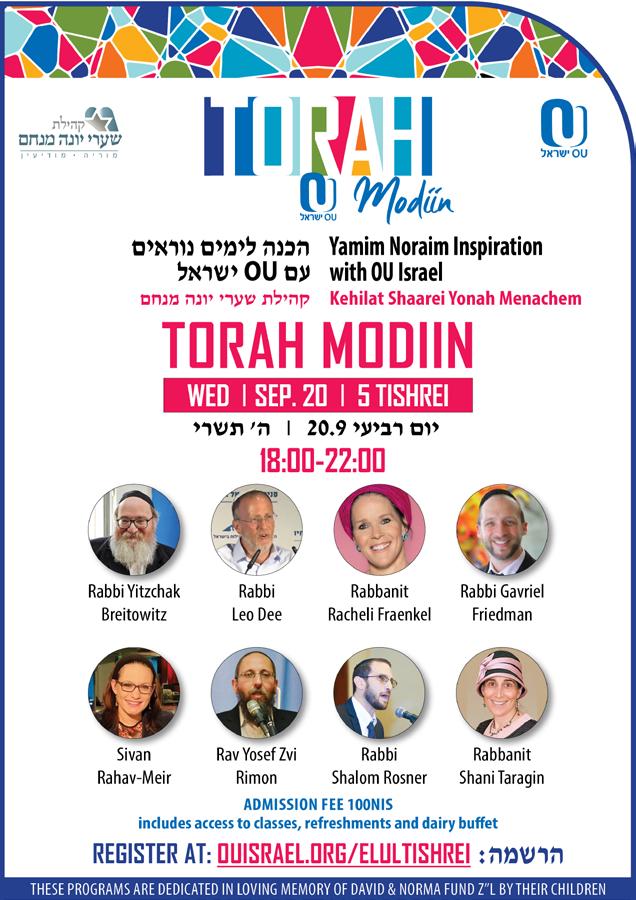
36 TORAH TIDBITS 1532 / NITZAVIM-VAYEILECH
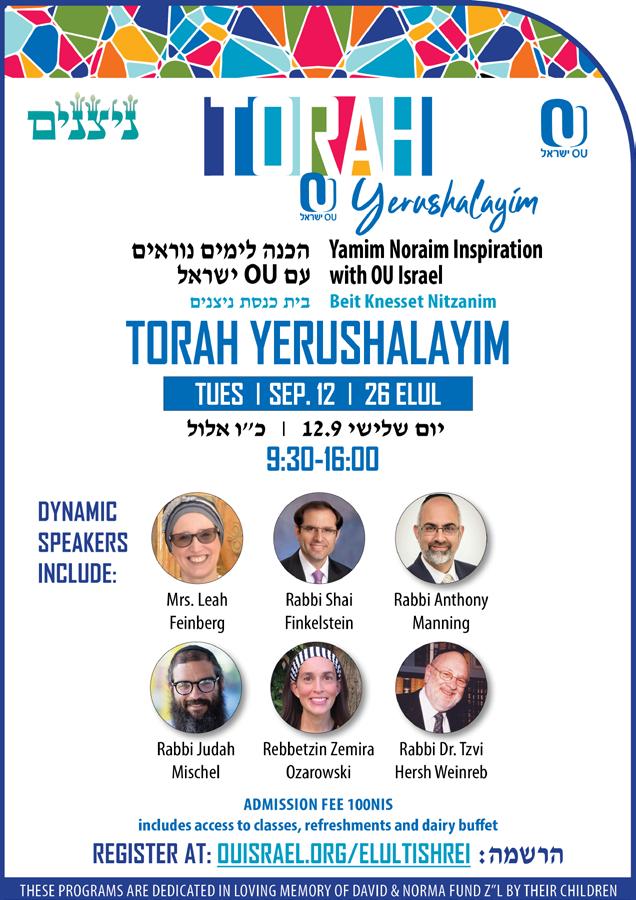
OU ISRAEL CENTER 37
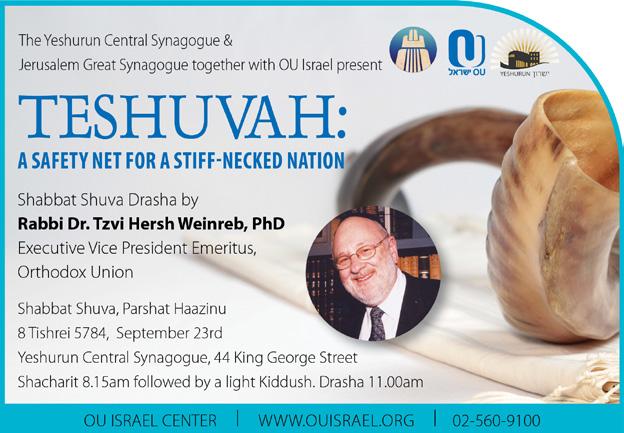

38 TORAH TIDBITS 1532 / NITZAVIM-VAYEILECH
GET FIT WHILE YOU SIT: Exercise for ladies
Sundays 12:45-1:30pm at the OU Israel Center

Sura Faecher 0504153239
המלש האופר
Yosef Ezriel ben Chaya Michal
Chana bat Bruriah
Feyge Sara bas Chaya Peshe
Nechama Charna bat Feigel
Leah Naomi bat Tova
אנדהאב לרפ ןב עשוהי םהרבא
הגלוא ןב קיזייא בל
הלחמ ןב ןתנוהי
URGENT TZEDAKAH APPEAL

For very ill, lonely widow woman with no family. Cancer survivor/ serious heart condition. Desperately needs money for basic needs/medical expenses/place to live.
joanmarastern@gmail.com/ 058-778-0691
Endorsed by: Rabbi Zev Leff/Rabbi Yaacov Hillel/ Rabbi Simcha Sheinberg/Rabbi Yisrael Gans/ Rabbi Dayan Dunner and others...(Badataz stamped)
Checks made out to Rabbi Yehuda & Yehudis Samet can be sent to: Rebbetzin Tzipporah Gottlieb-Heller, Neve
Yerushalayim Seminary, 1 Beit Yitshak Street, Har Nof, Jerusalem 94130 or to VAAD HARABONIM, Bank
Pagi 52 account 425699, branch 185, S.Shapiro/ 24/7 hotline for dontaions:1-800-223636
(Widows Account, account #: 3582-write on side)/ Tax deductible
Available online and at local Jewish bookstores. For further information call: 0523-360553
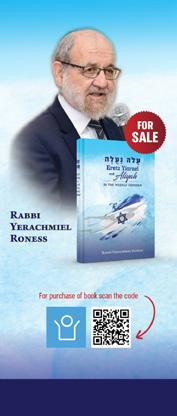
OU ISRAEL CENTER 39
NEW BOOK! הלענ הלע Eretz Yisrael and Aliyah in the Weekly Parshah
(Resumes Sept 18th)
Torah Yerushalayim

Pre - Rosh HaShana
Yom Iyun
@ Kehilat Nitzanin
3 Rechov Asher
Baka
ALL REGULAR DAYTIME SHIURIM WILL NOT TAKE PLACE


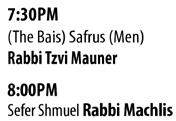
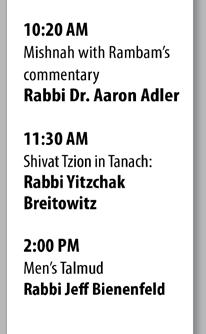

SPECIAL EVENT
8:00PM
Next Gen Elul Midrasha
(Women 20's - 40's)
Rabbi David Katz and Rebbetzin Shira Smiles
40 TORAH TIDBITS 1532 / NITZAVIM-VAYEILECH 10 11 TUE, SEPT 12
SPECIAL EVENT
8:00PM
Next Gen Elul Midrasha
(Women 20's - 40's)
Pack Rosh HaShana packages for needy families @ Pantry Packers
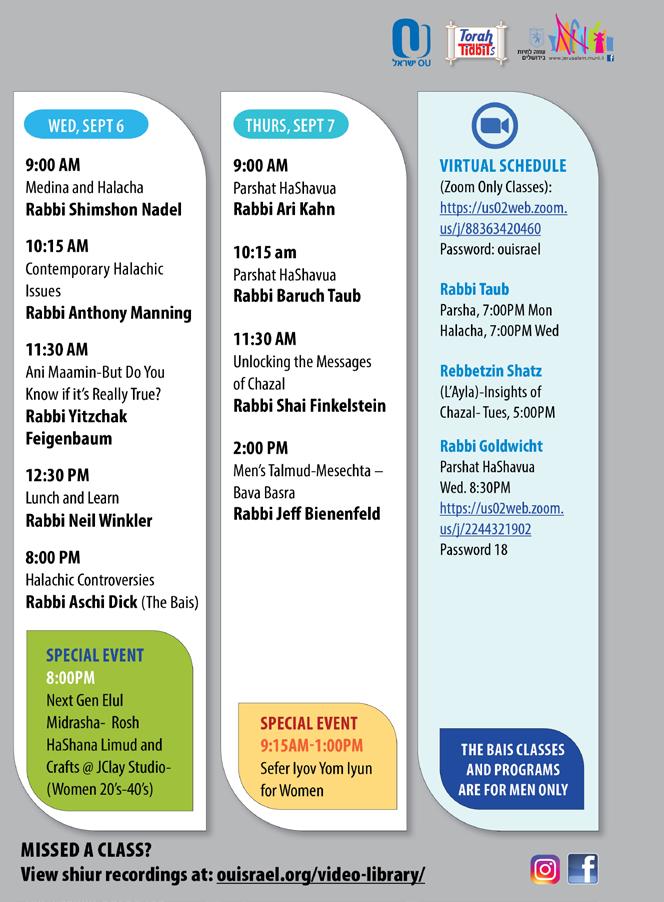
(Resumes Oct 19th)
(Resumes Sept 21st)
OU ISRAEL CENTER 41 13 14
Before receiving the Torah at Mount Sinai, there were some Israelites that, of their own accord, already kept the entire Torah. Since this is the case, why is this day so important?
SHIUR SPONSORS
Monday, August 28 - Rebbetzin Pearl Borow's Shiur was sponsored by Stephen & Nadine Cohen in memory of Roy Cohen z"l of Durban, South Africa
Tuesday, September 5th - Rebbetzin Shira Smiles Shiur was sponsored by the Frist family in loving memory of Elisheva Frist z”l on her first yahrzeit
לז ןמלז תב אמיס עבשילא תמשנ יוליעל
Tuesday Morning, September, 5th was sponsored for a full and complete refuah shleima for Miriam Yitle bat Rochel
On the day of Matan Torah 2 things changed. Firstly the Jews gained a connection to Hashem. Hashem put his essence into the Torah so when he gave it to us both those that had and had not kept the Torah before were now keeping it because of this connection to Hashem’s essence.
All learning on Monday, September, 11th is sponsored by Yacov & Rina Kaufman, in loving memory of Yacov's father Shimon ben Yisrael Eliezer z"l and Rina's brother Pesach Yehuda ben Pinchas HaLevi hy"d, whose Yahrzeit's are on 23 Elul
Monday, September, 11th - Rebbetzin Pearl Borow's Shiur is sponsored in memory of Vicky Rimel
לולא ו"כ ה"ע סינאמ ףסוי תב הרובד
Secondly, the Torah given at Mount Sinai is able to have an effect on the physical world whereas before Torah and mitzvot were considered strictly spiritual matters.
By her family in Neve Tzuf
Rabbi Shai Finkelstein's Shiur
is sponsored for the 2023 - 2024 academic year by the Sondhelm and Wertenteil families in memory of Mel David z"lםחנמ
ל"ז
הקבר אביוטו ריאמ םהרבא ןב לדנמ
Rabbi Adler’s Shiur
is sponsored for the 2023-2024 academic year by the Frist family in memory of their beloved daughter and sister Elisheva Frist a"h תב אמיס עבשילא
ה"ע ןמלז
Sunday, August 20th - Full Day of Learning
was sponsored by the Friedman Family in loving memory of Raizel bat Osher a"h on her shloshim
Rabbi Yitzchak Feigenbaum's Shiur Wednesday, August 23rd is sponsored by Avigail Barzilay in loving memory of her father Simcha Alter ben Aharon z"l
Rabbi Goldscheider’s Shiur
has been sponsored for the 2023 Academic Year
The Talmud (Shabbat 88b) states that when the Jews heard G-D’s divine voice, they all died from its intensity and afterwards G-d brought them back to life. I think this emphasizes why Hashem cannot be openly present in this world. For if he was, the Jews’ free will would no longer be preserved and we would follow Hashem in everything. If his awe and will were so apparent, we would be compelled to follow him without having a real choice.
ל’’ז המלש ןב בוט םשו ה’’ע םהרבא תב םירמ תמשנ וליעל Rebbetzin Shira Smiles Shiur is sponsored for the 2023 academic year by Dr. & Mrs. Menachem Marcus in memory of their parents, Rose & Dr. Emanuel Marcus z”l -
ל”ז סוקרמ השמ ןב יכדרמו ריאמ ףסוי תב לזייר Rosi and Ernest Strauss z”l -
JLIC at Tel Aviv University does amazing work in bringing Jews together and teaching us all about the torah we received at Mount Sinai. JLIC, I believe, helps us
ל”ז סוארטש דוד ןב לאינדו םהרבא תב דומיל
Rabbi Breitowitz’s Tuesday ShiurMinchat Chinuch
is sponsored for the academic year 2023 by Rabbi Refoel & Sharon Auman in memory of their parents Edith & Reiner Auman z”l
ד”יה לאפר תב ה”ע רתסאו ל”ז קודצ ןב הנוי and their son Rabbi Shmuel Eliyahu Auman z”l
י”נ לאפר ברה ןב ל”ז והילא לאומש ברה
Rabbi Goldin’s Shiur
is sponsored for the 2023 academic year by Dr. & Mrs. Menachem Marcus in memory of beloved aunts

Irma Haas a”h and Hilde Myer a”h
Rabbi Manning’s Shiur
has been sponsored for the 2023 academic year
ל’’ז ןמלק ןב גילזו ה’’ע תידנרב תב הנרב תמשנ יוליעל Rabbi Taub’s Weekly Thursday Parshat HaShavua Shiur
is sponsored by The Jewish Legacy Foundation
ing college students and young professionals. JLIC Israel’s goals include: building a warm and welcoming Jewish community for students and young professionals; providing engaging and dynamic Jewish education; providing a supportive home environment for Olim; providing resources for personal and religious growth, including personal mentoring, Aliyah support, religious guidance and leadership development. Current JLIC programs in Israel include: Reichman University - Herzliya; Bar Ilan University - Givat Shmuel; Tel Aviv University; Tel Aviv for Young Professionals; and Jerusalem. Contact: Rabbi Jonathan Shulman, Director of OU-JLIC in Israel shulmanj@ou.org
Shabbat
7:00-9:00pm
smadi_bida@walla.co.il
PRI HADASH
details,
42 TORAH TIDBITS 1532 / NITZAVIM-VAYEILECH
NOTE TORAH TIDBITS ADVERTSING DEADLINES THROUGH SUKKOT
Hashana, Sep. 15-16 » Thursday, Sep.
Kippur-Sukkot, Sep.
Thursday, Sep.
PLEASE
Rosh
7th Shabbat/Yom
22-23 »
14
Breishit, Oct. 13-14 » Sunday,
Call Ita Rochel: 02-5609125 or ttads@ouisrael.org OU ISRAEL CENTER 91
Oct. 8th
WRITING WORKSHOP AT THE OU ISRAEL CENTER
10.30-12.30
WOMEN'S
Monday mornings
For more
call Ruth 02-628-7359 or Judy 054-569-0410
DOROT - The OU Women's Intergenerational Choir Director Hadassah Jacob 052-384-7230
Evenings
Monday
KFAR ETZION

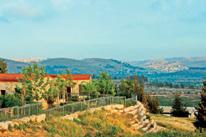
NOVEMBER 24-25
TEL AVIV

MARCH 1-2
2023-2024
MITZPE RAMON

MAY 31-JUNE 1
NCSY Israel is the premier youth movement in Israel dedicated to connecting, inspiring and empowering English-speaking teens through the values of Zionism, Torah and Tradition. Find out more at israel.ncsy.org


OU ISRAEL CENTER 43
ISRAEL
shabbatons
SAVE THE DATES NCSY
Regional
Visit

Israel

The Israel Calendar is an online platform showcasing virtual and in-person English-speaking programming throughout the country. All events posted on the calendar are designed for Olim seeking to connect with like-minded Anglos while benefiting from English-oriented events.



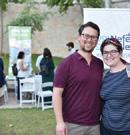
www.theisraelcalendar.org

Hosting an event? Post your events on the calendar and share your program with the expansive Nefesh B'Nefesh community all over Israel.



Cafe Oleh
VIRTUAL
SIGN UP TODAY!
Join us for a cozy Hebrewlearning session at our next Cafe Oleh session!
www.nbn.org.il/cafeoleh

44 TORAH TIDBITS 1532 / NITZAVIM-VAYEILECH
The Nefesh B'Nefesh
Calendar to explore English-language events taking place all over the country!
FOR



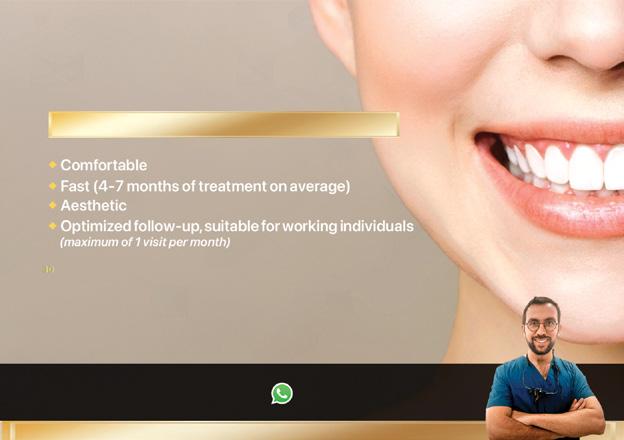
Exclusively for sale: renovated apartment with lots of potential, Beit HaKerem, JLM

Renovated ground floor apartment with huge potential. On the most sought-after street in the neighborhood, a deadend street with a park and near a commercial center.

3.5 rooms apt, 72 sqm. In a very advanced process of Pinui Binui, the majority is already signed for the process. After the completion of the project, the apartment will be 30 sqm larger, with a balcony, parking and storage unit. A worthwhile investment, family-friendly area.
Proximity to Shaarei Tzedek, light rail, Route 16, schools and more...
OU ISRAEL CENTER 45 Real Estate | Investments | Management services NOAM HOMES Real Estate Professionals Sign up today and elevate your real estate experience! office@noamhomes.com Scan to subscribe to our NEWSLETTER Look for us: NOAM HOMES Noam Homes Even Sapir 24, Jerusalem 058-793-2222
058-516-1356
Ouriel:
SALE
CONTACT US TODAY TO RECEIVE INFORMATION ABOUT OUR EXCEPTIONAL DEALS! • Highly motivated • Real estate ambition • Licensed agent • Experience • Full-time availability • Vehicle required • Fluent in English & Hebrew (other languages a plus) noa@noamhomes.com WE ARE HIRING! LICENSED REAL ESTATE AGENT JOIN OUR TEAM SEND YOUR CV TO
TORAH VEHA'ARETZ INSTITUTE
 BY RABBI MOSHE BLOOM en.toraland.org.il
BY RABBI MOSHE BLOOM en.toraland.org.il
The Pomegranate #2
FOOD AND BEVERAGE IN TANACH AND CHAZAL

The pomegranate is one of the seven species, and appears in a few places throughout Tanach.

In antiquity, the pomegranate was eaten raw or preserved, and juice and wine were prepared from its seeds. The Gemara ( Shabbat 144b) states that people from the house of Menashya bar Menachem would regularly juice pomegranates. Shabbat 115a states that it is permitted to remove pomegranate seeds in the late afternoon of Yom Kippur when it occurs on a weekday, to save time at the end of the fast.
AS THE NAME OF A PLACE AND PESON
In contrast to other trees from the seven species, many settlements bore the name of the fruit rimon: Ein Rimon was a city in the portion of Shimon (Yehoshua 19:7), today identified as Hurvat Rimon, located south of Kibbutz Lahav. Gat Rimon in Dan’s portion (Yehoshua 19:45) was a Levite city. Today, Moshav Gat Rimon, near Petach
Tivka, bears its name.
Shaul sat “beneath the rimon at Migron” ( I Shmuel 14:2); this probably does not refer to a pomegranate tree, which does not offer much shade. This is the name of a place Rimon, identified with the village Ramon, located southeast of Ofra, where archeological findings dating back to the First Temple times were discovered. The Jewish settlement Rimonim is located nearby.
There is also the mention of a person in Tanach bearing the name of the fruit: Rechav and Ba’anah, sons of Rimmon of Be’erot (II Shmuel 4:2).
POMEGRANATES AND BEAUTY
It seems that pomegranates are seen as a manifestation of beauty because of its symmetry, red luster, and many shiny seeds. It is also the largest fruit of the Seven Species. Its symmetrical crown also magnifies its beauty.
Rabbi Yochanan’s beauty is compared to that of a pomegranate (Bava Metzia 84a): "One who wishes to see something
46 TORAH TIDBITS 1532 / NITZAVIM-VAYEILECH
resembling the beauty of Rabbi Yochanan should bring a shiny silver goblet … and fill it with red pomegranate seeds … and position it between the sunlight and shade. That luster is a semblance of Rabbi Yochanan’s beauty.”

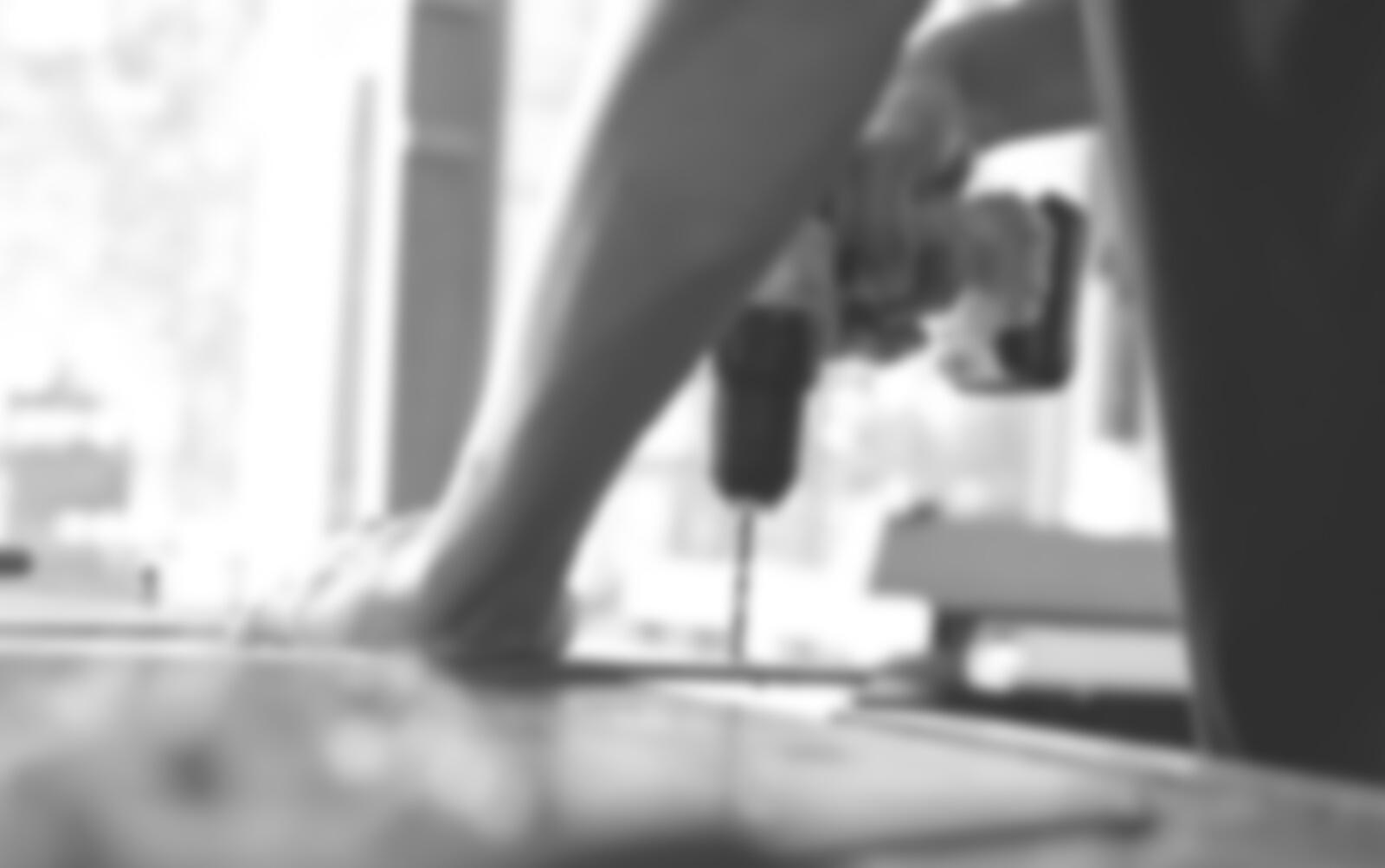
The Gemara (Sukkah 31a), in regard to the etrog which is called peri eitz hadar, says that if someone lacks an etrog it is forbidden to take a pomegranate in its place. From here we see that a pomegranate was also viewed as a magnificent fruit.

ORDER ONLINE AND GET THE PRODUCTS YOU PREFER DELIVERED STRAIGHT TO YOUR DOOR! ORDER TODAY AND ENJOY SUPERIOR QUALITY, SELECTION AND SERVICE! Use coupon code welcome2ftf and save 5% off your first order! American Service! Want to shop from the convenience of your home? American Products & Specialty Items! Top quality, organic & regular Mehadrin
ANSWER keep and maintain your home in good condition. HANDYMAN SERVICE +972 54-686-1843 24 /6 For all your home Real Estate Appraiser Repair Technician Electrician Locksmith Painter and more For appointment or questions call Shlomo:
KNOW WHAT TO
SMILES Faculty, OU Israel Center
Special Song
The last of the 613 mitzvot is found at the end of parashat Vayelech. “Ve’ata kitvu lachem et hashira hazot ve’lamdah et Benei Yisrael sima be’fihem – So now, write this song for yourselves, and teach it to the Children of Israel, place it in their mouth.” (Devarim 31:19) The Talmud (Nedarim 38a) teaches that this is a mandate to write one’s own sefer Torah. It is curious that the Torah is referred to here as a song. This begs the question – Perhaps the command is to only write the song, not the whole Torah? And if this is a commandment to write a sefer Torah, why are we not told explicitly to write a Torah, but to write this song?
The Rambam notes that since it is forbidden to write sections of the Torah, the mitzvah is clearly to write the entire Torah, including this song. The Beit Yosef explains that since the Shira was sung at the end of the five Books of the Torah it is understood that one should write the entire Torah up until the very end.
Rav Shach, z”l in Bezot Ani Boteach explains beautifully that the Torah is the song of our lives. Both on an individual level, as well as on a collective one. We are all faced with numerous challenges and difficulties that make it very difficult to continuously sing a song to Hashem. However,
Torah is the one song that is eternal. The Torah gives us strength to persevere, to continue to believe and to continue to sing. Song reflects the emotion one feels as he understands the cherished value of life and the joy of living. Dovid Hamelech encapsulates this so beautifully when he says, “Chesed u’mishpat ashira – Of kindness and justice do I sing.” (Tehillim 101:1) Whether we experiences the beneficence or the judgement of the Ribono shel Olam, we can continuously be in a state of song. One who lives a Torah-directed life understands that all Hashem does is for the good, and specifically for our personal good, to become the best version of ourselves. Therefore, if we live with complete dedication to Torah, whatever the situation, we can live with the capacity to sing to Hashem unceasingly.
Rav Scheinerman in Ohel Moshe offers an additional profound insight. The Gemara (Chagigah 12b) teaches that Hashem extends graciousness during the day to one who learns Torah at night. This is based on the verse, “Yomam yetzaveh Hashem chasdo – In the day, Hashem will command His lovingkindess,” because “u’balayla shiro imi – even by night His song is with me ” (Tehillim 42:9). There are some songs that are sung to Hashem, like Shirat Hayam, “Ashira LaHashem – I will sing to Hashem.” However, there are other songs that are sung with Hashem, “imi,” this is the song of the Torah. When
48 TORAH TIDBITS 1532 / NITZAVIM-VAYEILECH REBBETZIN SHIRA
Avihu, Elazar and Itamar. Nadav and Avihu died without children. Elazar and Itamar serve as Kohanim with Aharon. Take the Leviim: they are to serve Aharon. The Leviim are responsible for the Mishkan: to support the Kohanim and the people, to facilitate the running of the Mishkan. The Leviim shall take the place of the first-born, who became obligated to me when saved in Egypt.

we study Torah, we are “singing” with Hashem! Rav Yerucham Levovitz would often marvel how the Rambam, in his explanation on the Mishnah, begins by stating, “Amar Hashem Yitbarach,” instead of the classic, “It is written in the Torah.” Torah is interactive, it is constant give and take between us and Hashem. What could be more inspiring than singing “with Hashem” every time we are involved in learning Torah! It is truly the most breathtaking experience.
There are 2 groups mentioned here: Kohanim and Leviim. The lineage of the Kohanim is given. It just doesn’t take much room. Because Aharon is a Kohen and his sons. But he only has 2. So the entire lineage of the Kohanim is 3 people. The Leviim, on the other hand, are an entire tribe,
celebrate
ports and beams. The total of the tribe of Levi is 22,000. On the front side, the east of the Mishkan, Moshe and Aharon and families camped.
The encampment around the Mishkan had 2 layers. The Leviim were in close, on 3 of the 4 sides of the Mishkan. The 4th side, the leading side, had Moshe and Aharon. The entire 12 tribes were farther removed on all 4 sides.

The 3 sons of Levi were family groups; Gershon, Kehat and Merari. They had full responsibility for the Mishkan. Their tasks fell in categories. Gershon; textiles. Kehat; furniture. Merari; building. Gershon took care of the curtains and coverings. Kehat, the important main vessels of the Mishkan. And Merari the structure of the building. 6th aliya (3:40-51) Count all the firstborn of the age of a month and above. The Leviim are to replace the firstborn. There were 273 more
Shabbos Bistro

Premium delicious shabbes meals




Openning hours: Thursday 12 pm-2 am
Friday 8 am-3 pm
OU ISRAEL CENTER 49
Every person who was not born in Israel and lives in the Holy Land should
02-9964469 | 054-8777347 Iben Shafrut 5, Rehavia, Jerusalem
RABBI JUDAH MISCHEL
Executive Director, Camp HASC Author of Baderech: Along the Path of Teshuva (Mosaica 2021)

Selichos: Whistle While You Work
The Holy Ba’al Shem Tov once praised a man who would smile, sing joyously and clap while reciting the serious Viduy prayer. The local townsfolk were fed up with this man’s bizarre behavior, and asked the Baal Shem Tov to convince him to stop. When the tzadik approached the man and inquired into the reason for his strange custom, the simple Jew explained:
“I am a servant of the King, and I have been charged with a tafkid, a job. On Yom Kippur, my orders are to clean the filth from the gutters of the royal palace and scrape away the layers of dirt from the King’s courtyard. While usually such work is unpleasant, working in the royal palace is the greatest privilege. How fortunate I am to be in the service of the King! I’m so excited to do His Will, whatever He wants of me. What a blessing it is just to serve the King!”
After meeting this special Jew, the Baal Shem Tov related that the man’s kavanos , intentions, were indeed lofty and praiseworthy.
In the context of preparing for Yom Kippur and entering the avodah of teshuvah, Rambam frames our act of vidui as “the
height of forgiveness” ( Hilchos Teshuvah, 2:7). We are charged with the joyous avodah of teshuvah, and the privilege to be cleansed before Hashem. However, it may not always seem joyous. “Cleaning the gutters”, and getting down into the nitty-gritty of the details of our wrongdoings in order to confess them, verbalizing our mistakes line by line (or even singing them) may seem strange and uncomfortable. It may be unpleasant to suggest that we may have committed the full spectrum of shortcomings in our Divine service and relationships with those whom we love: “We have robbed…we have falsely accused…we have misled others….”
Often we carry the heavy burden of our mistakes and can feel weighed down by the pain of guilt, remorse and regret for our wrongdoings and failures. We might at times feel oppressed by the possibility that we have not been forgiven, that vidui didn’t produce the “heights of forgiveness” for us. It may even appear as if the negative terminology of vidui presents a challenge or an obstacle to teshuvah.
Rav Avraham Yitzchak haKohen Kook, zy’a, addresses this kind of collateral damage that can result, especially when one
50 TORAH TIDBITS 1532 / NITZAVIM-VAYEILECH
who has developed spiritual sensitivity, yiras Shamayim and a fear of wrongdoing, recognizes that he or she may have done something to disappoint their Creator. Knowing that we are infinitely indebted to Hashem, and constantly responsible before Him, makes the awareness of a shortcoming terribly painful. As HaRav Kook writes, in this case we shouldn’t just passively wait for Hashem to remove the pain and impose upon us a sense of being forgiven:
,םלועה תונוועו ויתונווע לע דימת באוכה םדאה
םלועלו ומצעל חולסלו לוחמל דימת אוה ךירצ
היוהה לע דסח רואו החילס ךישממ אוה הזבו ,ולוכ
.תוירבה תא חמשמו םוקמה תא חמשמו ,הלוכ
אוה ךכ רחאו ,ומצעל לוחמל ךירצ הליחתבו
בורק בורקה לכו ,לכה לע תיללכ הליחמ ךישממ
פשמ לעו ,המשנה דצמ ,וישרש יפנע לע ,םדוק
לכו ,ומלוע ,ותמוא ,ורוד ,ויבהוא ,ותח לכ הלגתמו…האליע אגרדב םלוע דוסי אוה הזבו …לכב זונגה בוטה
One who grieves constantly for his sins and the sins of the world must constantly forgive and absolve himself and the whole world. In doing so, he draws forgiveness and a light of loving-kindness onto all of being, and brings joy to God and to His creatures.
He must first forgive himself, and afterward cast a broad forgiveness over all, the nearest to him first, on the branches of the roots of the soul, and on his family, his loved ones, his generation, and his world, and all worlds…and thus is revealed all the good that is hidden away in everything…
(Shemonah Kevatzim, II:150)
Forgiving ourselves and letting go of immobilizing guilt might sound like a difficult maneuver, as well. However if we meditate on the words of the Vidui text, we
will see deeper meaning in the repeated phrase,ךינפל

, “(Forgive us) for the sin that we committed lefanecha, ‘in front of You….’”
Lefanecha can also mean ‘in Your Presence’, as we sing on Friday Nights, “Pnei Shabbos , the Shabbos presence, let us receive….” If we recognize that we are always in the compassionate, royal Presence of Hashem even when we violate His will and command, something in us can shift. If in moments of shame and failure we are nonetheless lefanecha, it means we still have the zechus of working in the Royal Palace, in the service of the King. Then, despite our mistakes, we will appreciate Selichos not only as an avoda of seriousness, but as one of simchah, as well. We can see this avodah as a gift, an opportunity to be cleansed and uplifted by Hashem, and to improve our service to the King.
May we be blessed to taste the heights of purity and joy in complete teshuvah, and may we merit to fulfill the will of the Ribbono shel Olam with love and with song!
OU ISRAEL CENTER 51
.םימלועה
ונאטחש אטח לע
Please join people from all around the world connecting with Hashem through these beautiful tefilot and mitzvot.



























COME JOIN OUR TEFILLIN FAMILY
COME JOIN OUR TEFILLIN FAMILY
COME JOIN OUR TEFILLIN FAMILY
COME JOIN OUR TEFILLIN FAMILY























































































40 Day Women’s Nishmat Challenge
In honor of a refuah shalayma for
In honor of a refuah shalayma for
In honor of a refuah shalayma for לסיז
In honor of a refuah shalayma for
each day for 40 days in a row.
In honor of a refuah shalayma for



All we ask is that participants post a picture of the







each day for 40 days in a row.
40 Day Women’s Nishmat Challenge Modeh Ani
that they are reading in order to be eligible for
All we ask is that participants post a picture of the Nishmat that they are reading in order to be eligible for the ra e each day for 40 days in a row.
ra e each day for 40 days in a row.


40 Day Women’s Nishmat Challenge Modeh Ani
Please join people from all around the world and record a whatsapp "voice note" saying Modeh Ani each day and you will be eligible for daily amazing prizes.
Please join people from all around the world and record a whatsapp "voice note" saying Modeh Ani each day and you will be eligible for daily amazing prizes.
40 Day Women’s Nishmat Challenge Modeh Ani
that they are reading in order to be eligible for the


Modeh Ani
Please join people from all around the world and record a whatsapp "voice note" saying Modeh Ani each day and you will be eligible for daily amazing prizes.
40 Day Women’s Nishmat Challenge Modeh Ani
Please join people from all around the world and record a whatsapp "voice note" saying Modeh Ani each day and you will be eligible for daily amazing prizes.












Please join people from all around the world and record a whatsapp "voice note" saying Modeh Ani each day and you will be eligible for daily amazing prizes. In honor of a Refuah Shalayma for:

52 TORAH TIDBITS 1532 / NITZAVIM-VAYEILECH
אכענ ןב הירא יבצ.
In
Shalayma
הכלמ הרש ןב בוד םירפא and הכלמ המחנ תב םירמ לדייא for the men’s groupfor the women’s group Austria • Paris • Israel • Madrid • Venice • El Salvador • Pakistan • Rome • London • South Africa • Australia • Singapore • United States • Canada • Mexico • South America • Brazil • Iceland • Capri • Germany • Hong Kong • Panama • Dubai • Argentina • Barcelona • Florence • Japan • Ecuador • Various US Military Bases • And many more places •
honor of a Refuah
for:
Please join people from all around the world connecting with Hashem through these beautiful tefilot and mitzvot.
לסיז אכענ ןב הירא יבצ
All we ask is
a picture of
Nishmat
they are reading in order to be
for the
.
that participants post
the
that
eligible
In
הכלמ הרש ןב בוד םירפא and הכלמ המחנ תב םירמ לדייא for the men’s groupfor the women’s group Austria • Paris • Israel • Madrid • Venice • El Salvador • Pakistan • Rome • London • South Africa • Australia • Singapore • United States • Canada • Mexico • South America • Brazil • Iceland • Capri • Germany • Hong Kong • Panama • Dubai • Argentina • Barcelona • Florence • Japan • Ecuador • Various US Military Bases • And many more places •
honor of a Refuah Shalayma for:
Please join people from all around the world connecting with Hashem through these beautiful tefilot and mitzvot.
COME JOIN OUR TEFILLIN FAMILY
לסיז אכענ ןב הירא יבצ
ra e
.
Nishmat
הכלמ הרש ןב בוד םירפא and הכלמ המחנ תב םירמ לדייא for the men’s groupfor the women’s group Austria • Paris • Israel • Madrid • Venice • El Salvador • Pakistan • Rome • London • South Africa • Australia • Singapore • United States • Canada • Mexico • South America • Brazil • Iceland • Capri • Germany • Hong Kong • Panama • Dubai • Argentina • Barcelona • Florence • Japan • Ecuador • Various US Military Bases • And many more places •
Please join people from all around the world connecting with Hashem through these beautiful tefilot and mitzvot.
לסיז אכענ ןב הירא יבצ. All we ask is that participants post a picture of the Nishmat that they are reading in order to be eligible for the ra e
days in a row.
each day for 40
In honor of a Refuah Shalayma for: הכלמ הרש ןב בוד םירפא and הכלמ המחנ תב םירמ לדייא for the men’s groupfor the women’s group Austria • Paris • Israel • Madrid • Venice • El Salvador • Pakistan • Rome • London • South Africa • Australia • Singapore • United States • Canada • Mexico • South America • Brazil • Iceland • Capri • Germany • Hong Kong • Panama • Dubai • Argentina • Barcelona • Florence • Japan • Ecuador • Various US Military Bases • And many more places •
Please join people from all around the world connecting with Hashem through these beautiful tefilot and mitzvot.
לסיז אכענ ןב הירא יבצ
Nishmat
. All we ask is that participants post a picture of the
the ra e
In
of
הכלמ הרש ןב בוד םירפא and הכלמ המחנ תב םירמ לדייא for the men’s groupfor the women’s group Austria • Paris • Israel • Madrid • Venice • El Salvador • Pakistan • Rome • London • South Africa • Australia • Singapore • United States • Canada • Mexico • South America • Brazil • Iceland • Capri • Germany • Hong Kong • Panama • Dubai • Argentina • Barcelona • Florence • Japan • Ecuador • Various US Military Bases • And many more places •
honor
a Refuah Shalayma for:
NACHI REALTY 054-461-3943


For rent on Emek Refaim


4 rooms, 80m, parking, 2 small mirpests, 25 stair walk up, quiet as it does not face the street. Perfect for young family/roommates. 6200nis/month
Great family apartment in the best part of Katamonim Spacious 4.5 rooms, 100m with a 9m Sukka mirpeset, one floor up, good shape, 4 exposures, newly enovated bathrooms. 3.37m NIS
Great Deal in the best part of Har Choma right next to the Community Center Shopping & Shuls, 3 room spacious apartments with 2 bathrooms, Sukka mirpeset, Shabbat elevator, parking & storage, move in condition. 2.14M NIS
OU ISRAEL CENTER 53
Dorot Rishonim 3, Jerusalem (off Ben Yehuda) Tel: 02 563-7155 • www.SherlockSHats.com FR EE S HI PP IN G IN I SR AE L S P R I N G S U M M E R F A L L W I N T E R Hours: Sun-Thurs 10:00-20:00; Fri 10:00-14:00 “I F T H E H AT F I T S , I T ’ S S H E R L O C K ! ” S quality hats for every season
B”EH, this Rosh Hashanah We all support Yesh Ezra! SUPPORTING THOSE WHO STAND ALONE
• Enhancing welfare and shelter.
• Empowering the destitute.
• Offering a personal touch through our "Big Brother" program.
• Counseling and home visits.
• Assisting with Shabbat, Chagim, and family Semachot.
COMING SOON!
Our new and expanded Website!
THIS WEEK: Urgent! Raising funds for an orthopedic bed for an elderly invalid woman
Checks
“Yesh Ezra” - POB 31476, Romema, Jerusalem, 9136101 Bank transfer


Bank Mercantile (17) Branch 642, A/c 79747843 (Send Asmachta for tax receipt*)
Credit Card
Call Sara – 077-820-0196
Sun/Mon/Wed (10:15 am - 2.45 pm)
Website: www.yeshezra.org. Click on Donate Now
54 TORAH TIDBITS 1532 / NITZAVIM-VAYEILECH Beating the banks every time
Menachem Persoff - 050-570-1067
menpmp@gmail.com
INQUIRIES:
|
GuitarHisGrandson
A THREE-GENERATIONAL MUSICAL CONCERT IN BEiT TOVEI HA’IR
MELODIES FROM SELICHOT AND THE HIGH-HOLYDAY PRAYERS
Rabbi-Cantor


RabbiEmeritus,WesternMarbleArchSynagogue,London
LIONELROSENFELDCantorship&Song
Together WITH
ORIROSENFELD
Maestro
Tuesday
gidon ROSENFELD


His Son
Song
Raymond Goldstein

Piano
With a brief introduction of blessings and inspiration in Hebrew and English from the Rabbinical Team





19 th Tishrei 5784 4
September
COME WITH JOY !
Registration is required. If you are 70 + independent and considering senior living please register with binyamin margo 054-4465276
*6422
www.tovei.co.il
SIMCHAT SHMUEL
BY RABBI SAM SHOR Program Director, OU Israel Center

This coming Motzei Shabbat, we Ashkenazim begin to recite Selichot in preparation for Rosh HaShana and the Aseret Yemei Teshuva (our Sefardic brethren have been reciting Selichot throughout this entire month of Elul).Traditionally this period of Selichot is filled with a real sense of community, of belonging to something bigger than ourselves, as we gather together to recite Selichot as a tzibur. Unfortunately, it seems that aspect of the Selichot experience will be absent this year. I’d like to focus on one short passage that we will recite many times during this period as part of the daily Selichot.
V’Zacharti et Briti Yaakov, V’Af et Briti Yitzchak, V’Af et Briti Avraham Ezkor, V’Haaretz Ezkor - And I will remember my covenant with Yaakov, and also my covenant with Yitzchak, and also my covenant with Avraham, I will remember, and the Land I shall remember...
There are numerous questions to be asked about this verse. Why are the Avot listed in reverse chronology? What does it mean that Hashem will remember the covenant with each of the Avot? What does it mean that Hashem will remember the Land of Israel?
Rav Yaakov Moshe Charlap, zt’l, one of the talmidei muvhakim of Rav Kook zt’l, offers a beautiful explanation of our verse (Sefer Mei Marom-chelek Nimukei Hamikraot), both it’s reverse chronology,
and the reference to Hashem remembering the Land.
If Am Yisrael merits to personify the values of Yaakov Avinu, who represents the coming together of the legacies of all three generations of our illustrious Avot and Imahot, then they certainly will be deserving of redemption....
Even if we don’t fully live up to this level represented by Yaakov Avinu, but simply exhibit the character trait of mesirut nefesh-personified by Yitzchak Avinu, the willingness to risk everything to sanctify Hashem, and for the sake of Am Yisrael, we will also be recalled and deserving of redemption.
And if this character trait is not found among us, but we still personify the values of kindness and compassion for our fellow human beings,emulating the ways of Avraham Avinu, then this too will be recalled, and we will be worthy of redemption.
And even if, chas v’shalom, none of these important character traits are present, and the only merit that we possess is that we have returned to live in the Land, and revive the ruins and build once again on our illustrious history, even if that is seemingly the only merit we possess, for this reason alone Hashem will bestow upon us His compassion and allow us to return to Him, and His Torah HaKedosha - V’Haaretz Ezkor.
As we prepare to recite these words each day throughout the Selichot period,
56 TORAH TIDBITS 1532 / NITZAVIM-VAYEILECH
may we be reminded of the many merits we each possess, the many fine character traits we have learned from the illustrious generations who came before us, and gain strength in reflecting on the past century of incredible growth and transformation for Am Yisrael, here in Eretz Yisrael - V’Haaretz Ezkor. May we indeed merit through each of these treasured legacies to continue to receive Hashem’s unending compassion, and may we merit to finally experience the Geula Shleima, we have been waiting for, for far too long....Ketiva V’Chatima Tova.

Gemach for Chatan and Kalla:
Meals for wedding and Sheva Brachot at cost

Eida Hachareidis Hechsher
Tel:052-633-1744
gadgadood@gmail.com
BAKA - stunning 3 story house on a quiet & pastoral cul-de-sac, very high end designed, swimming-pool, large wrap around garden, parking
1221
Real Life Rescues
Real Life Rescues
EMT Saves Baby from Severe Allergic Reaction Following First Taste of Tahini
First Responders Reunite With Boy They Saved During A House Fire
Three weeks ago, a 6-year-old boy was seriously injured in a residential fire at his home in Petah Tikva. An intensive care team from United Hatzalah, led by volunteer physician Dr. Dvir Bar On, responded to the emergency.

On a recent Tuesday morning in Jerusalem, parents were feeding their 6-month-old baby and introduced him to tahini for the first time. Within minutes, the baby developed a severe allergic reaction. The infant's parents immediately called emergency services, seeking urgent help.
Upon arrival at the scene of the fire, medical and rescue teams were informed that a young child was trapped inside the burning apartment. After the boy was extricated from the building in serious condition by firefighters, the intensive care crew provided life-saving treatment, before transferring the child to the hospital.
United Hatzalah volunteer EMT Shalom Klein, alerted to the emergency through his proximity alert system, sprang into action as the first responder on the scene. Arriving promptly, Shalom was confronted with a distressing sight - a baby boy with swollen lips and tongue, struggling to breathe, and covered in a worrisome rash.

Last week, the doctor and EMTs involved in his rescue met with the child, who has since fully recovered and returned home. The boy’s parents told them: "Your presence was a manifestation of Divine Providence… Thank you for saving our son’s life."
In the heart of calm and pastoral BAKAPrivate arab house, 6 rooms, 500m + possibility of building 250m, huge garden, approx. 700m, completely renovated, underfloor heating + a/c, large parking, 5 bathrooms, 5 toilets, green
MENDEL 052-8980111
Recognizing the symptoms as indicative of an anaphylactic shock, the volunteer knew immediate intervention was crucial. Without hesitation, he administered a life-saving EpiPen injection, delivering a dose of epinephrine to counteract the severe allergic reaction. The powerful medication quickly took effect, and the infant's breathing became less labored. The swelling in the lips and tongue began to subside, providing much-needed relief to the child.
Volunteer physician Dr. Bar On and EMTs Shlomo Koritz, Elhanan Witztum, Yehudit Naizov, and Yonatan Cohen, told the boy: “We performed lifesaving treatments on you, and we are so glad to see you back in your house alive and well.”
MENDEL 0528980111
BAKA / MEKOR CHAIM – 4 rooms, 90m, 2nd floor + elevator, renovated by architect, fireplace, a/c, very central, close to all amenities
3050000 NIS - MENDEL 052-8980111
BAKA - New penthouse, 4 rooms in a small luxurious building with character, alone upstairs, 3rd floor + elevator, 4 orientations, 3 toilets, 2 bathrooms, terrace / sukkah, 70m, parking, store-room
5450000 NIS MENDEL 052-8980111
ADAM ST. - close to Arnona Hatzeirain a step building, very spacious 5 rooms + terracce, 40m, open view, renovated, private entrance, quiet, potential of adding extra unit
3290000 NIS - MICHAEL 052-3202488
MOSHAVA / In a building after TAMA 38, new apartment, 4 rooms, 3rd floor + elevator, balcony/partial sukah, opened sight, 2 bathrooms, calm, parking

MENDEL 052-8980111
In a small & pastoral street in the heart of BAKA - Penthouse/Duplex 5 rooms, terraces, 15m + balcony, 6m, 2nd & 3rd floor + elevator, 3 orientations, parking
MICHAEL 052-3202488
BAKA / MEKOR HAIM - 4 rooms, 90m, 2nd floor + elevator, completely renovated, fireplace, a/c, gas heating, very central, close to all amenities
MENDEL 052-8980111
The family gave the EMTs a certificate of appreciation in recognition of their dedication and efforts.
As the symptoms continued to recede, the EMT monitored his condition while awaiting the arrival of a mobile intensive care ambulance. Several minutes later, the ambulance team arrived and transported the infant to the nearest hospital for further treatment and observation.
Reflecting on the incident, Shalom emphasized the importance of having an EpiPen readily available. "It's a great thing I had an EpiPen in my medical kit," he stated. "An EpiPen can save a person's life within minutes and is a huge help for both EMTs and patients."
OU ISRAEL CENTER 57
Near Arnona Hatzaira, in a step building, very
BY RABBI MOSHE TARAGIN R am, Yeshivat Har Etzion
The Historical Voice of Selichot
Elul moments provide a platform for the illustrious days of Tishrei, when we stand in awe and judgement before Hashem. Numerous Elul halachot and minhagim create an ambience of heightened religious awareness. During the first Elul in history, Moshe remained atop Har Sinai for forty days, in fervent prayer, putting the finishing touches upon the second luchot, while securing our forgiveness. Each year since, we all climb our own “Elul mountains” searching for expanded religious consciousness.
One of the most powerful Elul minhagim is the selichot experience. The disruption of our sleep schedule, coupled with devout prayers create a mood of solemnity and soulful gravitas.

In addition to rearranging our schedules, selichot also reposition our location. In a famous phrase, Dovid Hamelech captures our collective yearning to never leave the house of Hashem:
ייח ימי לכ ’ה תיבב יתבש
Not all of us are able to forever remain in the house of Hashem, as the demands of this world draw us elsewhere. However, during this solemn month, when our thoughts turn to eternity, we tightly cling to
Hashem and to His house.
Thousands of years ago we spent much of Tishrei in the environs of Yerushalayim and the Mikdash. Absent our Mikdash, we simulate this assembly by augmenting our presence in batei Knesset and batei midrash. Selichot prayers launch a month-long vigil in Hashem’s home.
TWO DIFFERENT VOICES
Selichot are constructed upon the core tefillah of םימחרה תודימ ג”י or the list of 13 traits of divine mercy. The gemara claims that this list was first articulated by Hashem Himself, as He “personally” demonstrated this supreme form of tefillah to Moshe Rabeinu. Additionally, He assured Moshe that these divine traits would never be completely ignored, but would always elicit a divine response. Essentially, the 13 traits of divine mercy is the only tefillah segment coined by Hashem Himself. During these 40 days we recite this prayer over 100 times, depending upon different minhagim. The 13 middot dominate selichot and imbue them with a voice which desperately pleads for divine pity. Lost in our own futility and failure, we look to Hashem for forgiveness.
58 TORAH TIDBITS 1532 / NITZAVIM-VAYEILECH GEULAS YISRAEL
A DIFFERENT VOICE
Though the divinely authored list of the 13 traits of mercy provides the foundation of selichot, throughout history, numerous piyutim or elegies were added to this core. Overwhelmingly, these elegiac poems describe our long suffering through our extended exile. To a limited extent these piyyutim voice remorse for sin, sincere confession, and desire for forgiveness. However, primarily, they portray the sadness of Jewish suffering.
The excruciating tone of these dirges is understandable as they were composed during a very gloomy era of our history. Though some of the earlier piyyutim of Ashkenazic selichot were written in the 9th century, and some of the later ones were composed in the 17th century, the majority were written between the 11th and 13th century in Western Europe. The medieval authors of these piyutim bore the violent brunt of crusader hostility, constant inquisitions and expulsions, uncontrollable blood libels, forced baptisms and brutal pogroms. In these piyyutim they vented their pain while looking to Hashem for salvation. These piyyutim are ‘period pieces” conveying desperation, tragedy, but also endless hope and faith. The dark world was crashing around them, but their faith remained unbroken. These piyyutim are spectacularly defiant in the face of unimaginable monstrosities.
Gradually, the art of piyut faded, newer ones weren’t written, and these medieval piyyutim became institutionalized in our selichot. Our selichot are therefore suffused with Jewish suffering and with our legacy of faith and less with the classic
NEW!!! CLASSIC RECHAVIA 4 RM APT IN THE HEART OF THE SHAAREI CHESED COMMUNITY
#2 IBN EZRA CORNER WITH KKL, 4 RMS, 1ST FLOOR, 93 M WITH ADDITIONAL LARGE ENCLOSED BALCONY WITH PARTIAL SUKKAH (OVER 100M IN TOTAL), HIGH CEILINGS, GOOD CONDITION.
ASKING PRICE 5,400,000
CALL DOV SHAPIRO FOR A SHOWING 052.5533739
BEAUTIFUL SPACIOUS BAKA FAMILY HOME FOR SALE
186 SQM SPLIT-LEVEL HOME WITH TWO 40M TERRACES
7 ROOMS, 3 FULL BATHROOMS, 2ND FL (31 STEPS), GREEN AND BRIGHT, PRIVATE PARKING, STORAGE, EXCELLENT CONDITION, CHURCHLAND UNTIL 2077
PRICE REDUCTION!!!
NOW ASKING NIS 5,200,000
EXCELLENT INVESTMENT IN PINUI BINUI PROJECT CLOSE TO EMEK REFAIM

1 BDRM APT RENOVATED AND BRIGHT ON RABBI HISDA ST JUST OFF TSOMET ORANIM, 2ND FLOOR, RENTED FOR 4500 NIS, AFTER PINUI BINUI OWNERS WILL RECEIVE A 3 RM APT BTWN 66-71 M, WITH 12 M BALCONY, PARKING AND STORAGE ASKING PRICE NIS 2,100,000 CALL MICHAL FOR A SHOWING 052.4066620
Ilana Nelson 054.5341403
www.integrityrealestate.co.il
themes of teshuva and remorse for sin.
BARGAINING WITH HASHEM
This second voice of selichot, sounding the suffering of Jewish history plays a crucial role in our tefillot. When facing personal religious failure we feel sadness, frustration, guilt, and mortification. All these humbling emotions, hopefully, inspire us to resolute commitment for future improvement.
During this painful process of self-examination, we also bargain with Hashem. We look for some excuse, any excuse, to, at least partially absolve our colossal failures.
Rabbi Avraham Danzig, the 18th century Polish author of the classic halachik sefer known as Chaye Adam also composed the earnest confessional known as tefillah zakah which is recited as Yom Kippur commences. Toward the middle of this
OU ISRAEL CENTER 59
melancholy viduy and acknowledgement of past religious breakdowns we plead with Hashem to consider our daily struggles when judging us. Part of our religious failure is due to the constant pressure of daily life. We don’t invoke these struggles to completely exonerate ourselves of responsibility, but we do ask Hashem to factor these and other personal struggles into His evaluation of our behavior. Similarly, by mentioning past Jewish suffering in selichot we expect Hashem to exercise partial clemency.
SHLIACH TZIBBUR
Though we hope that Hashem considers past Jewish suffering in our personal judgement, we certainly hope that He factors it in when judging our people at large. Our selichot are patterned after the original encounter between Moshe and Hashem. The gemara portrays Hashem as donning a tallit and praying as a shliach tzibbur. Though we are strongly averse to applying any physical references to Hashem, this image underscores that, when reciting the 13 middos, we are all, like Him, meant to serve as a shliach tzibbur, even if we aren’t, officially, the chazan. During this period, we are all expected to pray for others.

There are so many Jews who depend upon us to be their shliach tzibbur. So many Jews are severed and disconnected from Judaism and will not experience the power and the glory of these great days. So many will casually attend services without sensing the grandeur and the majesty of standing in the presence of Hakadosh Baruch Hu. We can’t pray only for ourselves, when so many Jews need us to daven for them. They need a shliach tzibur to intercede on their behalf.

IDENTIFICATION
However, to daven for someone you must first identify with them and feel compassion for them. Noach fell silent for 120 years without uttering even one tefillah because he couldn’t feel compassion for a sinful generation which had degenerated into moral chaos. By contrast, Avraham opened his humble heart to the outlaws of Sedom and fought valiantly for their survival. To daven for Jews who can’t properly daven for themselves we first must identify with them.
However, so many have abandoned our traditions. Sadly, many have even abandoned faith in Hashem and in Jewish legacy. Painfully, many stand opposed to
60 TORAH TIDBITS 1532 / NITZAVIM-VAYEILECH
our great historical project of rebuilding our homeland. But these are the Jews who need our prayers most. How can we identify with Jews who have wandered so far, in order to genuinely daven for them?

Our selichot about Jewish suffering remind us that so many Jews walked out because of the immense pressures of history. Centuries of unbearable hatred and painful discrimination took a heavy toll on our people. Unfortunately, when Western civilization opened its doors to us in the 19th century, many gladly accepted the invitation, exchanging their faith for admission into general society. When pogroms continued unabated and the nightmare of the Holocaust ripped us apart, so many gave up hope.
We, Baruch Hashem remained faithful, and we are all miracles. But think upon Jews who did leave with mercy, not disdain. Read the selichot, imagine the darkness and the terror, and mourn for those who turned away in horror. We are heroes but they aren’t villains. Our ancestors were strong while theirs couldn’t summon that courage. Let the second voice of selichot preserve our belief in every Jew and empower us to daven for those who haven’t yet found their voice. Please
Jerusalem 9101302
OU ISRAEL CENTER 61
note the updated mailing address for the OU Israel Center: OU Israel
22 Keren Hayesod POBox 1441
HAFTORAH
BY REBBETZIN DR. ADINA SHMIDMAN INSIGHTS


Don’t Be Caught Off Guard
Upon your walls, Yerushalayim, I have appointed watchmen; all day and all night, constantly, they must never be quiet; those that remind Hashem, do not keep quiet!
The Navi declares, “On your walls, Yerushalayim, I have set watchmen that will never be silent by day or by night.” Who are these appointed watchmen guarding the walls of Yerushalayim? The Radak suggests that these watchmen are the mourners of Zion who daven for the restoration of Yerushalayim day and night. These watchmen, unlike sentry guards who take turns in their shift, take no rest or breaks. Day and night, day in and day out,
, their constant and consistent presence maintains guard over our precious Yerushalayim. Despite generations of distance from the holy city, the guards have never reneged on their duty maintaining their role from afar.
And what are the words recited on their watch? It is the prayers which reverberate in the spiritual and physical sphere, words recited through the generations. The watchmen plead for rebuilding of Yerushalayim and the restoration of the House of David as they recite the words of Shemoneh Esrei thrice-daily. In the Birkat HaMazon, the
watchmen request Hashem’s mercy in the restoration of the monarchy of the House of David and rebuilding the holy city of Yerushalayim. The Navi Yeshayahu beseeches the Jewish people, the watchmen of each generation to not be silent - םכל ימד־לא ה־תא םירכזמה to continue praying for Yerushalayim.
But does Hashem need to be “reminded” to bring the Geulah asks Rav Schwab. He responds poignantly that it is not Hashem that needs to be reminded but rather we need the constant reminder. During the night watch, in times of despair and tragedy, it is natural to cry out to Hashem for redemption. It is during the day’s watch, when the watchmen have a clear perspective and confidence in their ability to maintain safe guard, that prayers may lag. It is specifically then that the Navi reminds us that our tefillot will bring the redemption and we must continue to pray.
Like the dutiful watchmen of each generation, we cry out to Hashem day and night to remember His city, His people and His world. We pray for the day of redemption, as stated in our Haftorah,
For the sake of Tzion, I will not keep quiet and for the sake of Yerushalayim, I will not be silent until its righteousness shines brightly, and its salvation burns like a torch.
62 TORAH TIDBITS 1532 / NITZAVIM-VAYEILECH
םֹויה־לכ םירמֹׁש יתדקפה םלׁש ורי ךיתֹמֹוח־לע ־לא 'ה־תא םירכזמה וׁשחי אֹל דימת הלילה־לכו םכל ימד
הלְילּה־לכְו םוֹ֧יּה־לכּ
טֹוקׁש א אֹל םלׁש ורי ןעמלו הׁש חא אֹל ןֹויצ ןעמל רעבי דיפלכ התעוׁשיו הקדצ הגֹנכ אצי־דע
LULAV AND ETROG SALE

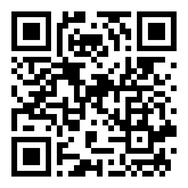

to sponsor an e-bike
United Hatzalah of Israel is the largest independent, non-profit, fully volunteer Emergency Medical Service organization that provides the fastest and free emergency medical first response throughout Israel. This year's sale will go toward providing a volunteer medic with an ebike, a fast-response vehicle that will allow them to reach the site of an emergency as fast as possible.

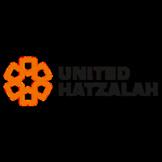
You can choose a set from various hidur options:
*Available in Jerusalem, Modi'in and Beit Shemesh **Free delivery available for orders over ₪700
I T E M םולהי ןירדהמ רדוהמ רשכ
Aravot Delivery*
Extra
P R I C E ₪250 ₪175 ₪135 ₪95 ₪7 ₪35 contact for questions and purchases Ezra: +972 53-230-8481
Purchase the 4 Minim Set and support lifesaving in Israel through United Hatzalah!
ORDER NOW NEW -HIGHEST LEVEL
TOWARDS MEANINGFUL TEFILLA
TOWARDS MEANINGFUL
BY REBBETZIN ZEMIRA OZAROWSKI Director of OU Israel L'Ayla Women's Initiative SHABBOS

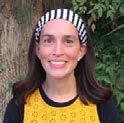
 BY REBBETZIN ZEMIRA OZAROWSKI Director of OU Israel L’Ayla Women’s Initiative
BY REBBETZIN ZEMIRA OZAROWSKI Director of OU Israel L’Ayla Women’s Initiative
ven though we already concluded our study of Birchat HaMazon in the last article, I recently came across a remarkable story about bentching that I thought would be important to share with you. The story illustrates a beautiful point brought down by the Sefer HaChinuch. The Sefer HaChinuch writes –
When I first got married, my Shabbos candle lighting experience started out as a pretty straightforward mitzvah. Quickly strike a match, light two candles, make the bracha, and the mitzvah was done. But over the years, this mitzvah has taken on a life of its own. Not only do my candles usher in the Shabbos, but they symbolize a special time to daven for my children. As my family has grown, ה”ב, so has the amount of candles that I light1, and so now my weekly Shabbos candle lighting is even more involved than a ‘Chanukiyah-on-thelast-day-of Chanukah’ experience.
Anyone who is careful with their Bentching, his livelihood will be provide for him with respect all of his days
We spent a lot of time in our Birchat Hamazon series discussing the meaning and significance of all of the Brachot of the Bentching. But beyond understanding the deeper meanings, we also need to make sure to be ריהז with our bentching, to be careful how we recite the Bentching, the respect we give to it, and the way we concentrate and focus. If we do our bentching right, we are told that Hashem will reward us with a good livelihood.
This story is told by Rabbi Yoel Gold and has a profound message for us in our own bentching.
A couple of weeks ago, as I lit the 8th candle, my ten-year-old son stood there staring at me and finally asked – “That one’s for me, right?” And he was right. Over time, I’ve developed my own little routine. First, I light the two big candles – one for me and one for my husband. I need to allow my own light to ignite, in order to be there for my husband. And then I move on to the other nine, trying to transfer over as much koach and bracha as I can to each child.
Two years ago, after the tragedy in Meron, a man named Chaim Ginz decided to try and be menachem avel as many of the victims’ families as possible. The first family he visited was the Zacbach family in Bnei Brak, who were mourning their 24 year old son, Menachem Asher. At the shiva house, the family gave out bentchers with the inscription – “The last will/
When I finish ‘lighting everyone’ and 1. Based on the Minhag to light an additional candle for each child brought down by the Likutei Maharich
request (האווצ) of Menachem Asher is to bentch out of a bentcher”. The family explained that at the age of 16, Menachem Asher had taken on the practice of always bentching from a bentcher and never reciting the bentching by heart. He took this commitment very seriously and would never wash and eat bread unless he was absolutely sure there was a bentcher available in the vicinity. Chaim Ginz heard this and decided to take on this practice as well, l’iluy nishmat this young man.
making the bracha, I recite the famous yehi ratzon, asking ןכשתו וניתב
- Hashem, help us to always have peace in our home so that your Shechina can rest here, and in turn, we can be successful in our parenting and be able to bring up our children to be 'ה ידבוע. And then I sing the famous song of ינכזו and I have a chance to give ‘quality Tefilla time’ to each and every one of my children. I sing the song and request from Hashem that my children be 'ה יבהוא (be full of love for Hashem)
םיקולא יארי (G-d Fearing), that they should be 'הב םיקבד (clinging to Hashem) and םלועה תא םיריאמ (they should light up the world with all of their Torah learning and good deeds and their service of Hashem). My gaze shifts from candle to candle, from child to child, as I focus on the challenges they are going through and the requests that I have for them. I finish my routine with a few other special Tefillot about raising children.
I can feel the special power inherent in these moments; there’s something almost palpable in the air. Where does this koach come from and why is there such a widespread minhag to daven for our children after candle lighting?
About a month later, Chaim was feeling pretty stuck. He was having trouble making a living. He was a Sofer and he had just completed a project and was unable to find any more work. Day after day, he would show prospective clients samples of his work but they just kept turning him away. He was feeling very rejected and depressed. One day, he was in a special apartment in Bnei Brak which sofrim use as a place to do their work. He had something to eat and was ready to bentch. He didn’t have a bentcher on him so he was about to bentch by heart. But he remembered his commitment and began to search the apartment from top to bottom. Finally, after many minutes, he located a bentcher hidden under a stack of papers on the top of a bookshelf. He noticed that the bentcher was written in תירושא בתכ, the font used by sofrim. He admired the beauty of the writing and after bentching, he decided to use the bentcher to help him with his own writing. For three hours, he
Rabbenu Bechaye (Shemot 19:3) writes that since lighting Shabbat candles is a mitzvah incumbent mainly on women, the time of lighting is an auspicious one
64 TORAH TIDBITS 1532 / NITZAVIM-VAYEILECH
70 TORAH TIDBITS 1507 / TETZAVEH - PRE-PURIM 5783
”וימי
לכ דובכב ול ןייוצמ ויתונוזמ ,ןוזמה תכרבב ריהזה לכ“
Eלדגל
יניכזו
םינב ינבו םינב
םילשתו“
”....םינב לדגל ינכזו וניניב ךתניכש
for women to daven (as Tefilla is heard more during the time of doing a צitzvah). There are many things that women can and should daven for during this time, but the Chinuch of our children is especially apropos.
He writes that women are really the ones responsible for instilling their children with love of Hashem and His Torah during the formative years. They are often the ones to get their kids ready for school in the morning and it’s their compassion and encouragement that motivate them in their Torah learning and spiritual growth. He writes that since Torah is compared to light, it only makes sense that while lighting the Shabbos candles, women should seize the opportunity to daven for their children to cling to the light of the Torah. In fact, it says in Gemara Shabbat 23b -

- “One who is careful regarding the candles will have children who are Talmidei Chachamim.”
Often, we might feel that our Tefillot for our children go unanswered but the following story illustrates how our Tefillot are never in vain.
Rav Baruch Heimann is a well-respected Baal Teshuva and Talmid Chacham who lives in Yerushalayim. A few years ago, he explained how he merited to grow so much in his Avodat Hashem. He explained that his grandfather, Zalman Aran, was the Minister of Education during the earliest years of the state of Israel and was a very close associate and confidant of Prime Minister David Ben Gurion. Rabbi Heimann explained that
though his grandparents were completely secular, the one tradition they held on to was that his grandmother always lit the Shabbos candles. She knew this was a special time to pray for one’s children and so she would daven that her children grow up to be like the most respected man she knew….David Ben Gurion. One day, Ben Gurion met with the Chazon Ish to discuss the draft law. He was so impressed by the Chazon Ish that he shared his impressions with his friend Zalman Aran and concluded that the ‘Chazon Ish is more like an angel than a human being’. Zalman repeated everything he had heard to his wife. The next Shabbos, when Mrs. Aran lit her candles, she thought to herself – If Ben Gurion has so much respect for the Chazon Ish, I might as well daven that my children grow up to be like the Chazon Ish. And so she did, week after week. Rabbi Heimann explained that it was in the merit of his grandmother’s Tefilla that he and many of her other grandchildren were zocheh to become Baalei Teshuva.
The Gemara (Berachot 32b) saysםקיר
that no tefilla recited will ever return empty-handed; it will always have some effect even if it’s not until much later. May we all be zocheh to see how the Tefillot we say by the Shabbos candles impact on our children and grandchildren for many years to come.
OU ISRAEL CENTER 65
הלוכי איהש ,הרותל הביס איה הבוטה השיאה שרדמה תיבל הנב תא ךישמהל
ידימלת םינב היל ןייוה – יגרשב ליגרד ןאמ יאה“ ״םימכח
תרזוח ותלפת ןיא ותלפתב ךיראמה לכ
Editor, Torah Tidbits

Building the Land: A Collaborative Effort
Every member of the Jewish people must know that engaging only in the secular aspects of the revival of the nation contributes to only one facet, and his service is not yet a complete undertaking until he also assists and enhances the religious renewal as an all encompassing national construct. Similarly, it must be known to every member of the people of Israel, one who builds the sacred underpinnings of the nation, as long as he does not assist and bolster the mundane aspects of the nation, such a person[’s efforts] lacks the fullness of character of the sacred service that is required.
The more we recognize this collaboration, then [the result will be that] the traits of the nation will attain their fullness of character - with the joy of heart of all who await the salvation of Israel from Zion, with truth and righteousness. (Eretz Chefetz 6:6)
Rav Kook expressed in this passage the essential need for collaboration between the religious sector together with those Jews engaged predominantly in the
physical building of the Land. Achieving harmony begins with both sides seeing the important role each sector plays in the process of the blossoming of the nation.
Indeed, Rav Kook laid out this vision in an address that he delivered when he first settled in the Land of Israel in 1904. It was only months after Rav Kook moved to Jaffa, Israel that the eminent founder of modern Zionism, Theodor Herzl, passed away, on July 3, 1904.
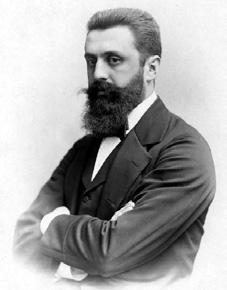
His words not only addressed the death of Herzl but contextualized the new Zionist movement in philosophical/ theological terms. Rav Kook makes use of a lesser known tradition
that the Messiah of Yosef precedes the Messiah of David. Yosef stands for material redemption, as Yosef was the provider for Israel. Yosef stands for the Jew of Egypt, where he spent the majority of his life in a secular setting. It was there that Israel ran the risk of being ‘swallowed up” by that world. David, on the other hand, stands for the spiritual, Torah-inspired redemption
66 TORAH TIDBITS 1532 / NITZAVIM-VAYEILECH
RABBI AARON GOLDSCHEIDER
- which will not, however, be effective if it is physically weak. The physical well being of Yosef is vital and must be recognized as such. Our long exile enabled us to keep the spiritual values of Judaism with Torah learning and observance; there was no opportunity for our physical development as a nation.

There can be no final redemption, Rav Kook suggests, without the harmony of the body and soul of the Jewish people. Both camps must be willing to value one another.
Rav Kook’s remarkable eulogy gives his view of Herzl as having the stature of a precursor to the Messianic redemption. Peppered with many intricate quotations from the Torah, the Talmud and Zohar in support of his views, Rav Kook couches his eulogy of the secular founder of Zionism, Herzl, in the presentations of two Messiahs and the redemption that all Jews can hope for.
Rav Kook in his concluding words of his eulogy for Herzl cites a perplexing passage from the Talmud in which two great sages state that they prefer to be no longer living when the Messiah arrives. Their reasoning is that there will be so much suffering leading to that momentous occasion that they would rather avoid it entirely. Rabbi Yosef disagrees: “Let the Messiah come, and I will be privileged to sit in the shadow of a donkey’s excrement.” Apparently he means to say that he is willing to undergo all the pain and disgrace associated with his arrival.
Rav Kook suggested another interpretation. The first set of rabbis mentioned in the passage symbolized the type of rabbis who are detested by those who are
rebellious to the Torah. They abhorred the lack of spirituality and their degeneration of Torah values and mitzvot. Nevertheless, Rabbi Yosef was confident that eventually all the negative manifestations would surrender to the light of Torah. In the midst of the darkness, the shadow of chamor , materialism and physicality, a little light will appear which dispels much darkness. Rav Kook’s concluding words powerfully sum up his entire presentation: “The prerequisite for the generation of Messiah is the ability to utilize all forces, even the most coarse, for the sake of good and the singular sanctity with which Israel was crowned.”

OU ISRAEL CENTER 67
donated by Marion & Michael Silman Ita Rochel 02-560-9125





OU ISRAEL CENTER 69 FOR MORE INFORMATION PLEASE CALL OR WHATSAPP WELCOME TO NETIVOT 0% FINANCE COST 058 7295810 NO ATTACHMENT TO BUILDING INDEX (0%) NO LAWYER COST STARTING AT 1,188,000 ONLY 15% DOWN AND THE REST AT OCCUPANCY SPACIOUS APARTMENTS HIGHEST BUILDING STANDARD RICH SPECIFICATIONS PARKING + MACHSAN INCLUDED ENSUITE IN ALL UNITS RIGHT NEXT TO "BABA SALI" TZIYUN 3 - 4 - 5 Room and Penthouses PRESALE rbsviews.com
The Profile of a Supervisor
Last time we explained the need for halachic supervision in fertility treatment and the halachic rationale for employing women as supervisors.

HOW DO YOU SELECT YOUR SUPERVISORS?
The clinics generally work at hours that may be inconvenient for many people, such as early morning, Friday afternoon, Purim, Chol Hamoed etc. The women must be willing and able to work at such hours. Therefore, it is not a job for women with young children. The women must live in reasonably close proximity to the laboratories and be able to get to work without being caught in traffic. A supervisor cannot call up and say that she will be late since the traffic is heavy. The treatment must be performed at the set time, as there are patients who are waiting to be treated next.
The laboratories are usually quite small and the embryologists work under great pressure and with great precision. The supervisor must be able to work under such conditions, being able to observe all that is going on throughout the procedure, without being intrusive or upsetting the workflow. The embryologists cannot work if someone is talking with them, asking
them questions, or disturbing their work. The supervisor must be able to be present without interrupting the embryologist, while respecting their work.
MUST THE SUPERVISOR HAVE A SCIENTIFIC BACKGROUND?
The truth is that we prefer someone with no science background at all. The reason is that the supervisor’s job is to observe the process and ensure that there was no human error. She does not have to understand the science of the procedure, or comment on the efficacy of one procedure versus another. Neither should she compare one clinic to another, and share information, such as “But in another hospital, they do it this way…” Sometimes, a person with a scientific training will be concerned with the science of the treatment, and this will both adversely affect her ability to simply observe, and may disturb the embryologist who cannot answer all her questions and explain why and what she is doing.
While some people will argue with this approach, it is born out of our many years of experience with numerous different clinics and many supervisors worldwide.
We must, of course, train the supervisors in the relevant medical procedures. Otherwise, they are incapable of supervising the treatments.
More on this next time.
70 TORAH TIDBITS 1532 / NITZAVIM-VAYEILECH
RABBI GIDEON WEITZMAN
Machon Puah for Fertility and Gynecology in Accordance with Halacha


OU ISRAEL CENTER 71
FROM THE VIRTUAL DESK OF THE OU VEBBE REBBE
RAV DANIEL MANN

Shehecheyanu on Winning a Court Case
Question: As a lawyer, it is clear to me that a client who wins a court case should recite Shehecheyanu, and one who loses should recite Dayan Ha’emet. After all, a court victory is truly good news and involves much more money than a suit! Am I correct?
Answer: There are different types of triggers for Shehecheyanu: cyclical mitzvot, holidays, and fruit (Shulchan Aruch, Orach Chayim 225); acquisitions of significant objects (ibid. 223); finding out good news (mainly, ibid. 222). In your question, you use the latter two interchangeably; we will separate them.
The parameters of acquiring a house or “important” clothing or furniture are quite defined, and when they are met, one does not need to be overjoyed for Shehecheyanu to be called for (it applies even when one pays top dollar). We do not say Dayan Ha’emet when such items are lost or broken. A court award rarely meets the classic parameters.
Because good news (ibid. 222:1) and bad news (ibid. 2) are very broad, the beracha trigger must elicit strong feelings. Most types of Shehecheyanu, according to most, are not obligations, but are voluntary and
recommended when applicable (see Rama, OC 223:1; Mishna Berura 223:7). In cases where it is unclear whether they are warranted, most poskim (see Mishna Berura 223:12) apply safek berachot l’hakel (refrain when in doubt); some say it does not apply to such a subjective beracha when one feels the urge to recite it (see Tzitz Eliezer XIV:67).

The above may explain what the Mishna Berura reports – most people do not make berachot over good and bad news. (The minhag is that one recites Dayan Ha’emet as a full beracha only for the death of a close relative – see Mishna Berura 223:8).
One could solve beracha l’vatala questions by combining it with a Shehecheyanu on clothing (Shulchan Aruch, OC 600:2) or by omitting Hashem’s Name. However, people have the right and maybe should (see Mishna Berura ibid.) make the berachot according to the opinions that when there is true happiness from good news (and sadness from bad), one makes a full beracha. This can include a variety of significant financial events (see Mishna Berura 222:1).
However, your clients should be consistent. Take a real estate agent who does not make Shehecheyanu when he makes a sale. Should he recite it only when his fee was questioned, and he wins the same amount
72 TORAH TIDBITS 1532 / NITZAVIM-VAYEILECH תמשנ יוליעל ל"ז ןמצלז לאיזוע םהרבא ןב םירפא
לאוי
The Orthodox Union - via its website - fields questions of all types in areas of kashrut, Jewish law and values. Some of them are answered by Eretz Hemdah, the Institute for Advanced Jewish Studies, Jerusalem, headed by Rav Yosef Carmel and Rav Moshe Ehrenreich, founded by HaRav Shaul Yisraeli zt”l, to prepare rabbanim and dayanim to serve the National Religious community in Israel and abroad. Ask the Rabbi is a joint venture of the OU, Yerushalayim Network, Eretz Hemdah... and OU Israel’s Torah Tidbits.



of money in adjudication?! In fact, as a dayan, I see several reasons why a ruling in adjudication should not bring on Shehecheyanu or Dayan Ha’emet.

Many rule not to recite Shehecheyanu on a fruit that was grown in a forbidden manner (see Yabia Omer V, OC 19) – that is not supposed to make you happy. Adjudication at times includes aveirot, e.g., going to a secular court; lying or misrepresentation; improperly insulting one’s “opponent.” If one thereby received money he did not deserve, there should not be a beracha. If one lost the case, he should usually assume he deserved to lose, in which case Dayan Ha’emet is not appropriate, as he did not really lose anything.
In cases where one side is clearly right, the ruling reveals the obvious; it is likely different from the Mishna Berura’s (ibid.) retrieving property from a thief. If both sides have strong logic, making the ruling significant, one could factor in that his good fortune is at the expense of another, who is now upset (compare to the Ra’avya, Shabbat 289, who says not to make Shehecheyanu at a brit because of the baby’s pain).




There are other complications. In many cases, rulings include elements of winning and losing for both sides. Also, timing is not simple, considering that one: receives a ruling, there is time for appeal, and receiving payment can be a process (see Aruch Hashulchan, OC 223:4 on not making
Shehecheyanu at a wedding).
I have not seen classical poskim suggest these berachot for adjudication, and the minhag is not to do so. Finding a different way to thank Hashem, and contemplating how to be a most moral litigant or not be one at all, may be wiser than solving a halachic doubt by including a new suit.
OU ISRAEL CENTER 73
A s h k e l o n , I L 3 . 2 5 M N I S 4 B E D R O O M S 7th-floor apartment in a project finishing in June 2024 2 Parking Spots, Storage Room, 126 sqm Apt. + 21 sqm Large Porch. There are 3 Elevators including a Shabbat Elevator. Minutes away from the Ashkelon Marina N a h a r i y a , I L 1 . 8 M N I S 4 B E D R O O M S 18th fl apartment in a project finishing in June 2026 2 Parking Spots, Storage Room, 125 sqm Apt + 21 sqm Large Porch There are 3 Elevators including a Shabbat Elevator. N t h . N e t a n y a , I L 3 . 3 M N I S 3 B E D R O O M S 12th fl apartment in a project finishing in June 2025 1 Parking Spot, Storage Room, 103 sqm Apt. + 16 sqm Large Porch. With a Shabbat Elevator Minutes away from the beach and shopping, shuls, and much more. "SEASCAPE SERENITY: FIND YOUR COASTAL DREAM !" IZZY LEIZEROWITZ IL 972.52.682.9367 USA 786.385.8859 Broker Fee: 2% + VAT www.keteradvisors.com B a t Y a m , I L 3 . 6 4 M N I S 3 B E D R O O M S 13th fl. apartment in a project finishing in June 2027. 1 Parking Spot, Storage Room, 107 sqm Apt. + 12 sqm Large Porch. There are high-speed elevators including a Shabbat Elevator. Minutes from the beach & new Light Rail stop S u n , S a n d , a n d S p l e n d o r : Y o u r N e w B e a c h s i d e H o m e A w a i t s ! Having a dispute? For a Din Torah in English or Hebrew contact ‘Eretz HemdahGazit’ Rabbinical Court: 077-215-8-215 • fax: (02) 537-9626 beitdin@eretzhemdah.org



































OU ISRAEL CENTER 75 Interested in learning more about estate planning? Join us for a free webinar Wednesday, September 20th at noon To register contact Paul Kaplan (212) 613-8258 or KaplanP@ou.org. A small Sefer Torah with its own Aron Kodesh is available to shiva houses or for any other necessary occasion on a temporary free-loan basis. If needed call Uri Hirsch 0545513173 Selichot In Beit Knesset Beit Yisrael Beit Knesset Beit Yisrael in Yemin Moshe Rechov Pele Yoetz 2, Yemin Moshe Selichot during the week will start at 6:00AM Saturday Night September 9th 2023 10:00 PM First Selichot Services led by The Solomon Brothers Introductory words on Teshuva from Rabbi Chanoch Yeres {Atara Suna}
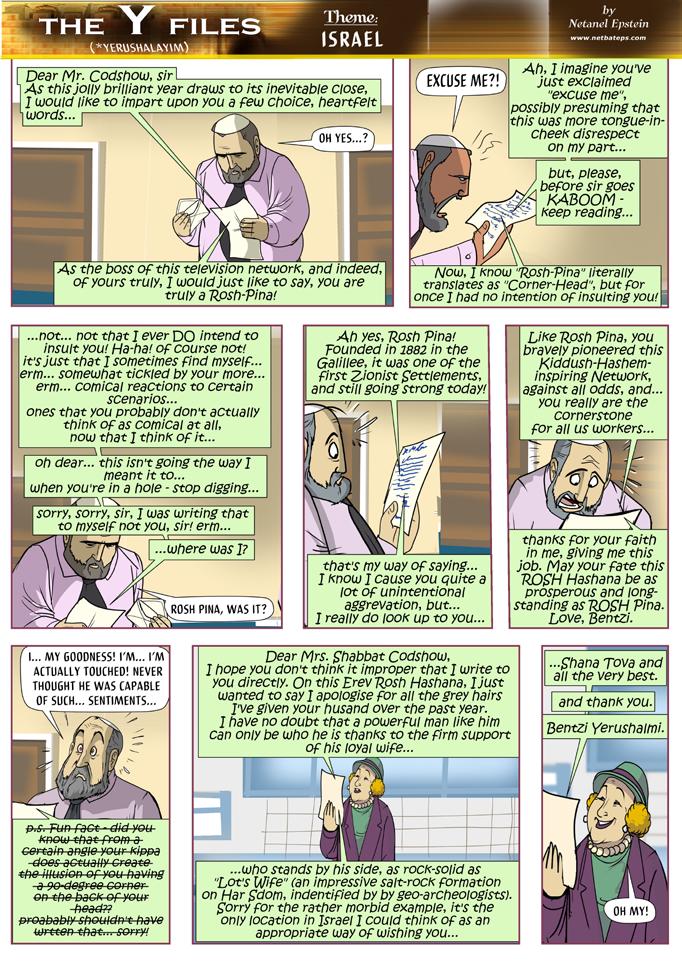

TORAH 4 TEENS
BY TEENS NCSY ISRAEL


ADELE NEMIROV BEIT SHEMESH CHAPTER DIRECTOR

HOLY, HOLIER, HOLIEST
Let me ask you a question: if you were to choose the person who would lead the Jews into the Land of Israel, would it be Yehoshua or Moshe? Seemingly, the ideal way to enter Israel, the birthright of the Jewish people and the holiest place on earth, would be with the greatest prophet that the Jews ever had, who spoke to G-d like a man speaks to his fellow and taught us the Torah. However, that’s not the case, and it begs the question: why?
In case you see this as Moshe’s decision, there are many sources to the contrary. The Midrash Rabba on Parshat Ve’Etchanan, for example, explains that the unusual choice of Ve’Etchanan as prayer hints to the fact that Moshe prayed 515 times to enter into Israel. It’s true that Moshe made mistakes in his leadership, but it’s easy to argue that those mistakes didn’t warrant G-d’s choice to remove Moshe as the leader right before one of the greatest moments in Jewish history.
G-d wouldn’t give us a second-rate leader to bring the Jews to Israel, so Yehoshua must have been the best option. But, the Gemara teaches us that Moshe was like
the sun and Yehoshua was like the moon, reflecting the light of Moshe instead of creating his own light. Was this not a downgrade or a weakening of leadership?
The Lubavitcher Rebbe explains that, while Moshe’s leadership would have been miraculous, having Yehoshua as a leader accomplished something much deeper. Chassidic thought teaches that the ultimate purpose of our existence in this world is to create a “Dira b’Tachtonim”, a dwelling place for G-d in the messiness, physicality, and imperfection of this world. Rather than the wondrous and miraculous leadership of Moshe, G-d preferred the humanity of the leadership of Yehoshua. Though it took more effort, failed battles, and political and religious complexity, it brought G-dliness further down into this world, advancing that ultimate purpose.
Every element of life can be challenging, messy, unideal, and deeply human. May we always remember that holiness and G-dliness comes in those moments.
LEORA KASHNOW 12TH GRADE

BEIT SHEMESH
YES WE CAN
Parshat Nitzavim-Vayelech is always read before and in preparation for Rosh Hashona.
78 TORAH TIDBITS 1532 / NITZAVIM-VAYEILECH
With the beginning of the new Jewish year everyone strives to improve their Midos and try their best to fulfill the potential they were given.
Every year we set goals for ourselves that we try to accomplish throughout the year. Although we try our best to fulfill them, in a moment of weakness we often give up on ourselves.

You may ask yourself, are we setting goals that we know we can’t reach?
But the real answer is no, we are not. The problem is that Yetzer Harah tries to make us believe that our goal is too big and far reaching to accomplish.
It's the exact same with our aspiration to learn Torah and do more and more Mitzvot. We want to, but the Yetzer gets us to believe that it's too much for us to handle.
This is exactly what Moshe prepared us for in this Parsha
Meaning it feels far because the Yetzer Hara causes the goal you had set for yourself to feel impossible to accomplish.
It’s neither in the sky nor beyond the sea. You don’t need to wait for anything or anyone. Don’t let yourself think that your goals and ambitions are far for you to accomplish.
That’s why Moshe closes with the words
Believe in yourself and you’ll be able to accomplish anything you want to do.
shalom!
OU ISRAEL CENTER 79
תאלפנ אל םויה ךוצמ יכונא רשא תאזה הוצמה יכ" אלו ...איה םימשב אל ,איה הקוחר אלו ךממ איה "איה םיל רבעמ
"דואמ רבדה ךילא בורק יכ“
Shabbat
COLLECTION
YOUR TIMELESS TREASURE
HAZORFIM'S "LEGACY" COLLECTION IS A CELEBRATION OF DEEP-ROOTED TRADITION AND SKILLED CRAFTSMANSHIP THAT REFLECTS THE PASSION OF TRUE ARTISTS.

Jerusalem
| Kfar Daniel | Bnei Brak | Tel Aviv | Haifa | Raanana | Ben Gurion Airport











 Rabbi Avi Berman Executive Director, OU Israel aberman@ouisrael.org
Gilinski Real Estate gilinski.co.il
Arnona Great Apt! 150 SQM, Sukka balcony, elevator & parking. #050-7225694
City Center Penthouse, 340 SQM, 9R, duplex, 2 terraces, parking, renovated. #052-6984466
Rabbi Avi Berman Executive Director, OU Israel aberman@ouisrael.org
Gilinski Real Estate gilinski.co.il
Arnona Great Apt! 150 SQM, Sukka balcony, elevator & parking. #050-7225694
City Center Penthouse, 340 SQM, 9R, duplex, 2 terraces, parking, renovated. #052-6984466



























 R av, Beit Knesset Beit Yisrael, Yemin Moshe
R av, Beit Knesset Beit Yisrael, Yemin Moshe






















































































 BY RABBI MOSHE BLOOM en.toraland.org.il
BY RABBI MOSHE BLOOM en.toraland.org.il




























































































 BY REBBETZIN ZEMIRA OZAROWSKI Director of OU Israel L’Ayla Women’s Initiative
BY REBBETZIN ZEMIRA OZAROWSKI Director of OU Israel L’Ayla Women’s Initiative































